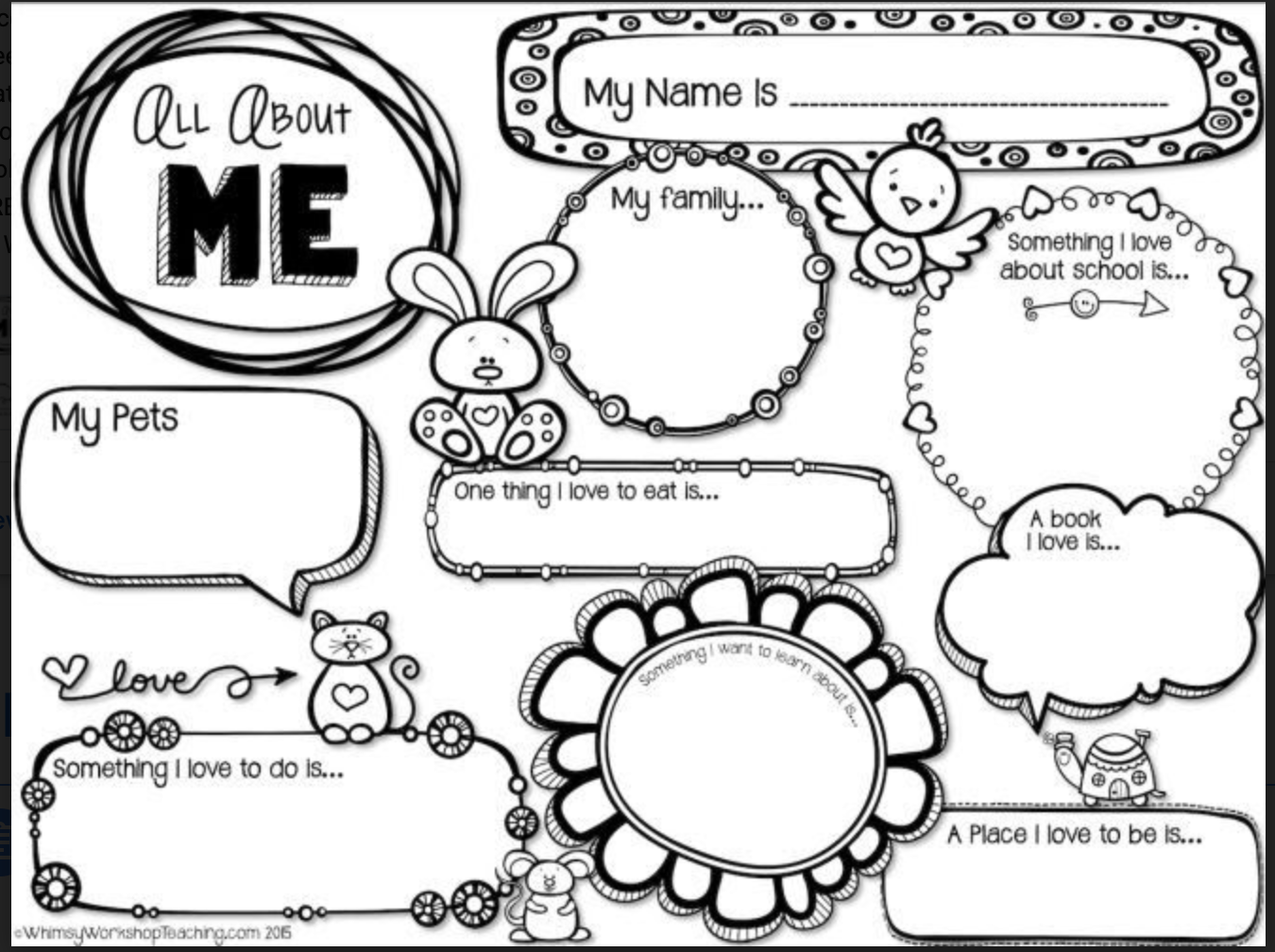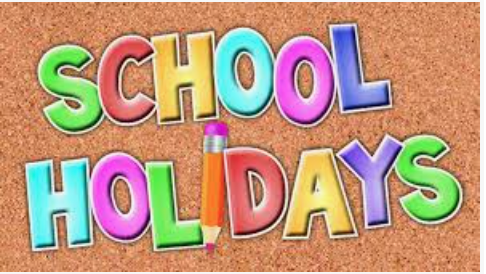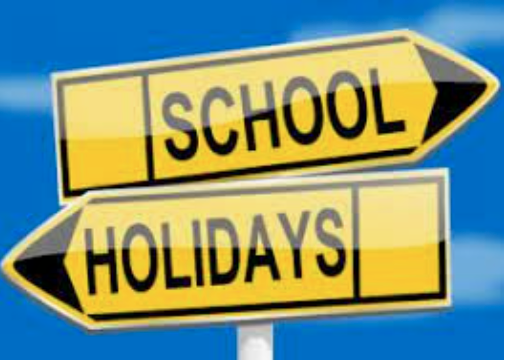7C2 Global Studies
Section outline
-
-
Imagine that you are the President of the MHJC Global Studies Club. You are responsible for creating a digital information book for our future Year 7 students that will explore reasons why the Treaty of Waitangi was signed.
Working individually, you are required to select 2 ideas that you would like to research, from the list provided.Please remember to refer to the rubric and to use the resources provided on MHOL and Google Classroom.
-
Application of mapping skills.
-
-
EXPLORE / TŪHURA learning intentions:
- We are EXPLORING our new school, MHJC and getting to know each other.
Kia ora 7C2,
A huge welcome to Coast/Takutai Whanua. My name is Mrs Raeesa Dada and I am you Global Studies teacher for this year.
I hope that you had an awesome holiday break and that you are ready to venture with your learning in Coast Whanau.



At MHJC we refer to this learning area as Global Studies.
Our learning context is Me, Myself & Us. We will be looking at our self identity, celebrating who we are and sharing our wonderful cultures with each other.
During our session this week we are going to do an activity using wool and sharing a bit about ourselves. :)
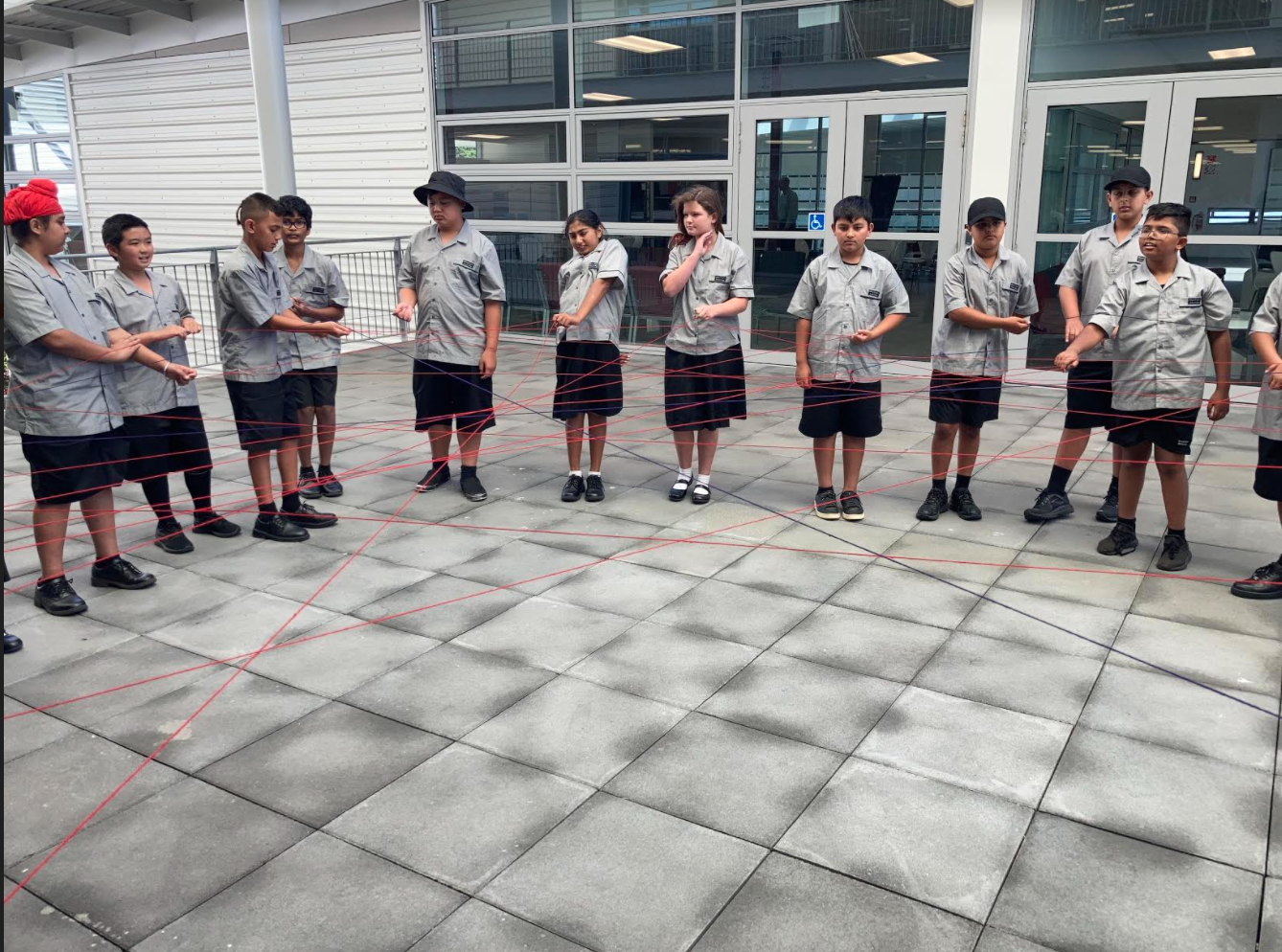
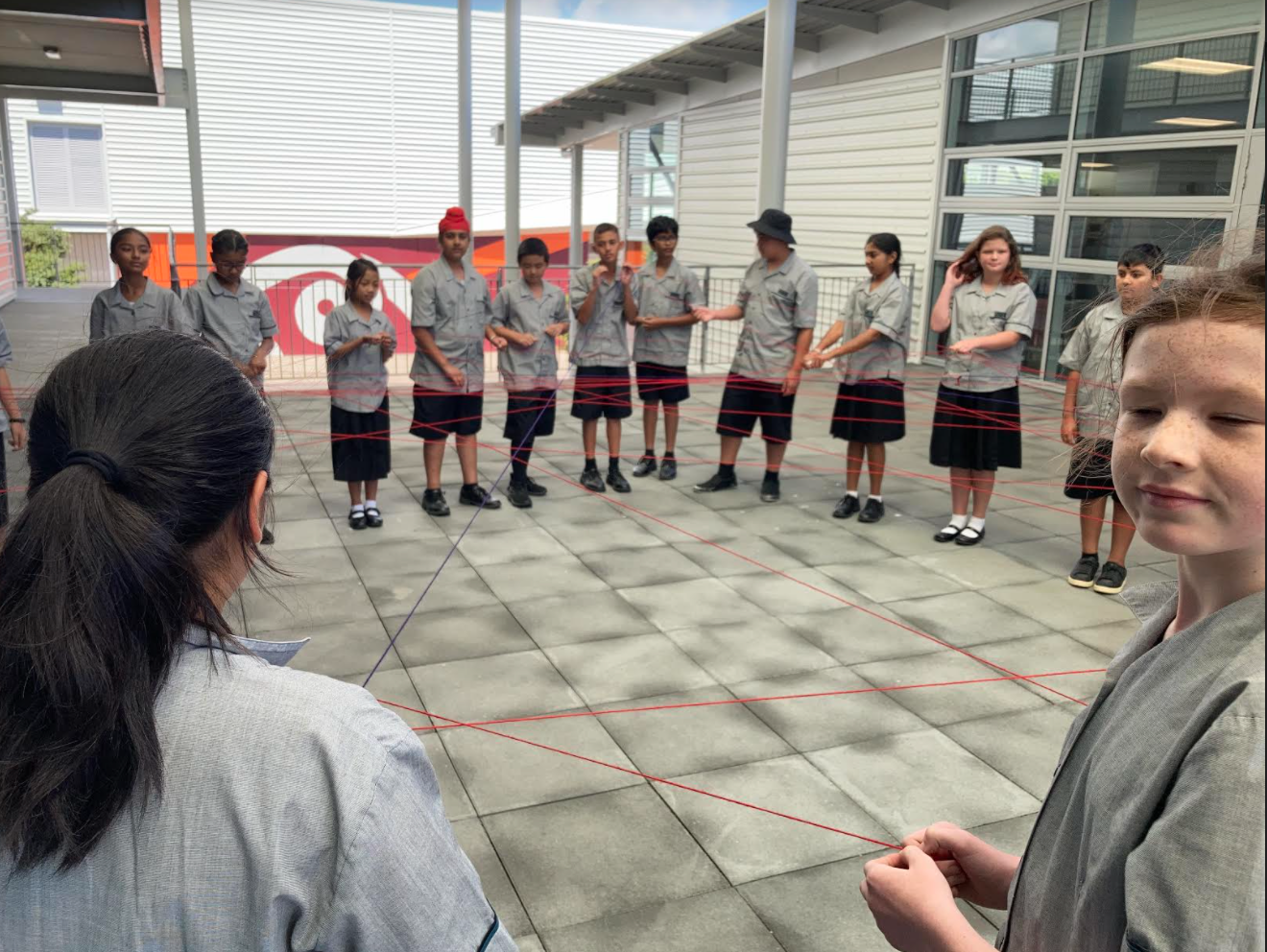
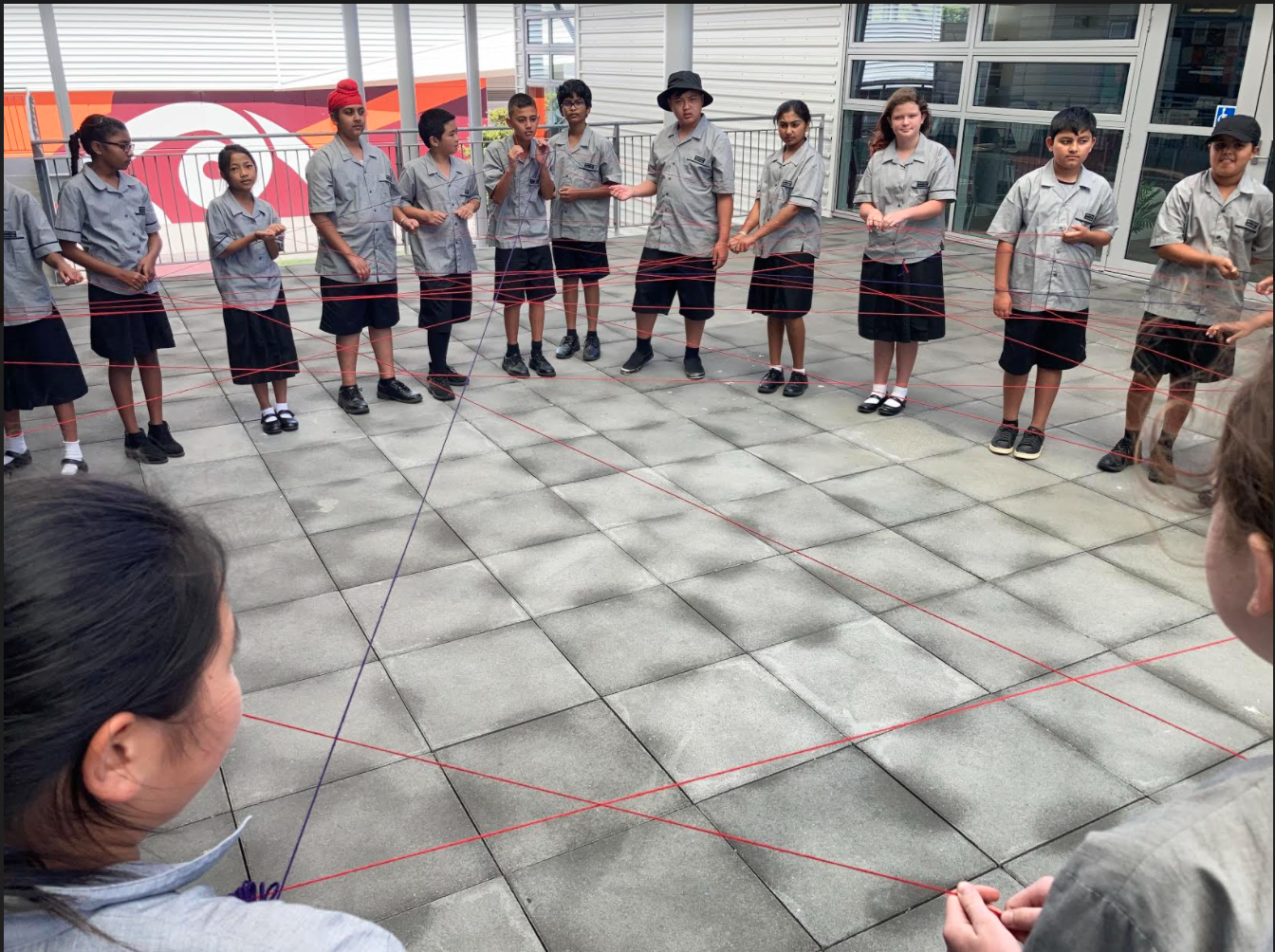
-
EXPLORE / TŪHURA learning intentions:
- EXPLORE / TŪHURA learning intentions:
- We are EXPLORING...to investigate students personalised life story and the vocabulary associated with this idea
- We are EXPLORING...to research the Treaty of Waitangi and its significance for us today in NZ
Kia ora 7C2,
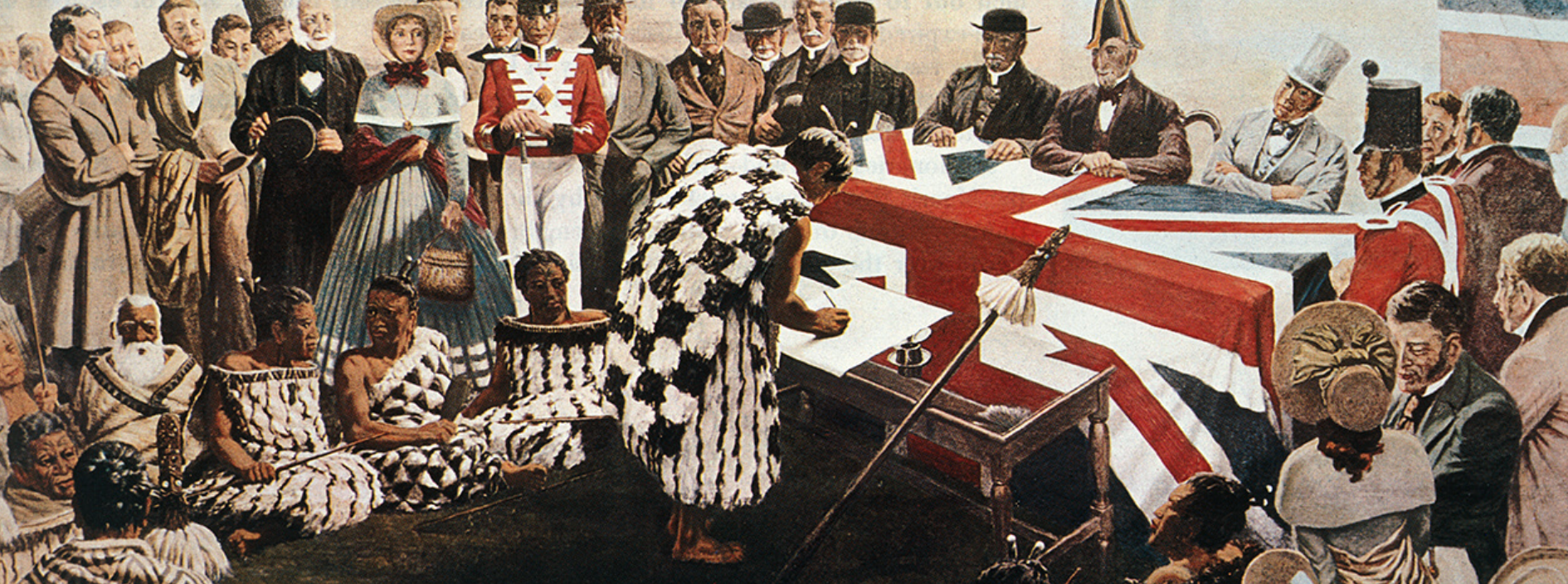
I hope that you have all had a lovely Waitangi Day.
This week we will be EXPLORING to research the Treaty of Waitangi and its significance for us today in New Zealand.
a) Who was the treaty an agreement between?
b) Why was a treaty needed?
c) Who translated the treaty into Te Reo Māori?
d) Who signed the treaty?
e) Why have there been disagreements about the terms of the Treaty?
f) Any other interesting facts
We will also be EXPLORING to research the significance of Chinese New Year in New Zealand.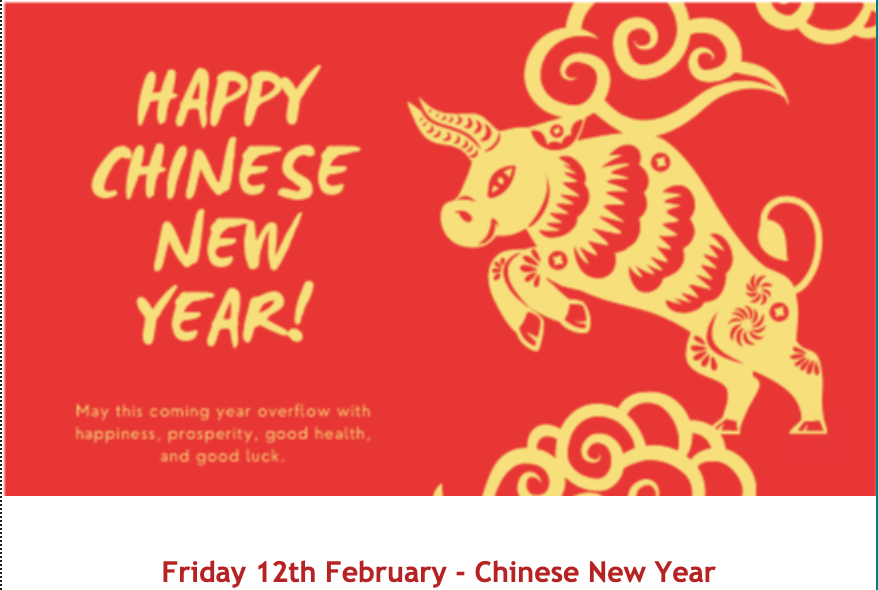
-
EXPLORE / TŪHURA learning intentions:
- We are EXPLORING through research, information about your culture and heritage that you would like to share with the class.
Kia ora 7C2,
Term 1 Learning Context: Me, Myself and Us
This term, our focus is on getting to know one another.
Introducing Myself
As discussed in class on Friday, this week you will be starting to plan your presentation for "Introducing Myself." This can be a digital presentation or completed on paper.
These were some of the ideas that you brainstormed on Friday(I've added a few extra ideas.):
- Your name (were you named after a relative? Does your name have a special meaning?)
- Your interests/hobbies
- Favourite subjects
- Your aspirations
- Your family (you can include your pets)
- A bit about your culture
- Your heritage/ ancestors
- Your family traditions
- You interests, values, and anything else you would like us to know!

Homework:
Ask your family for information that you are not sure about.
If you wish to include family photos, please make sure you have asked permission from your family first.
-
Kia ora 7C2,
Term 1 Learning Context: Me, Myself and Us
Introducing Myself
We will also be testing our General Knowledge by completing our Weekly Quiz.
-
EXPLORE / TŪHURA learning intentions:
- We are EXPLORING how Polynesian explorers navigated the Pacific and how they came to discover and settle in New Zealand.
Kia ora 7C2,
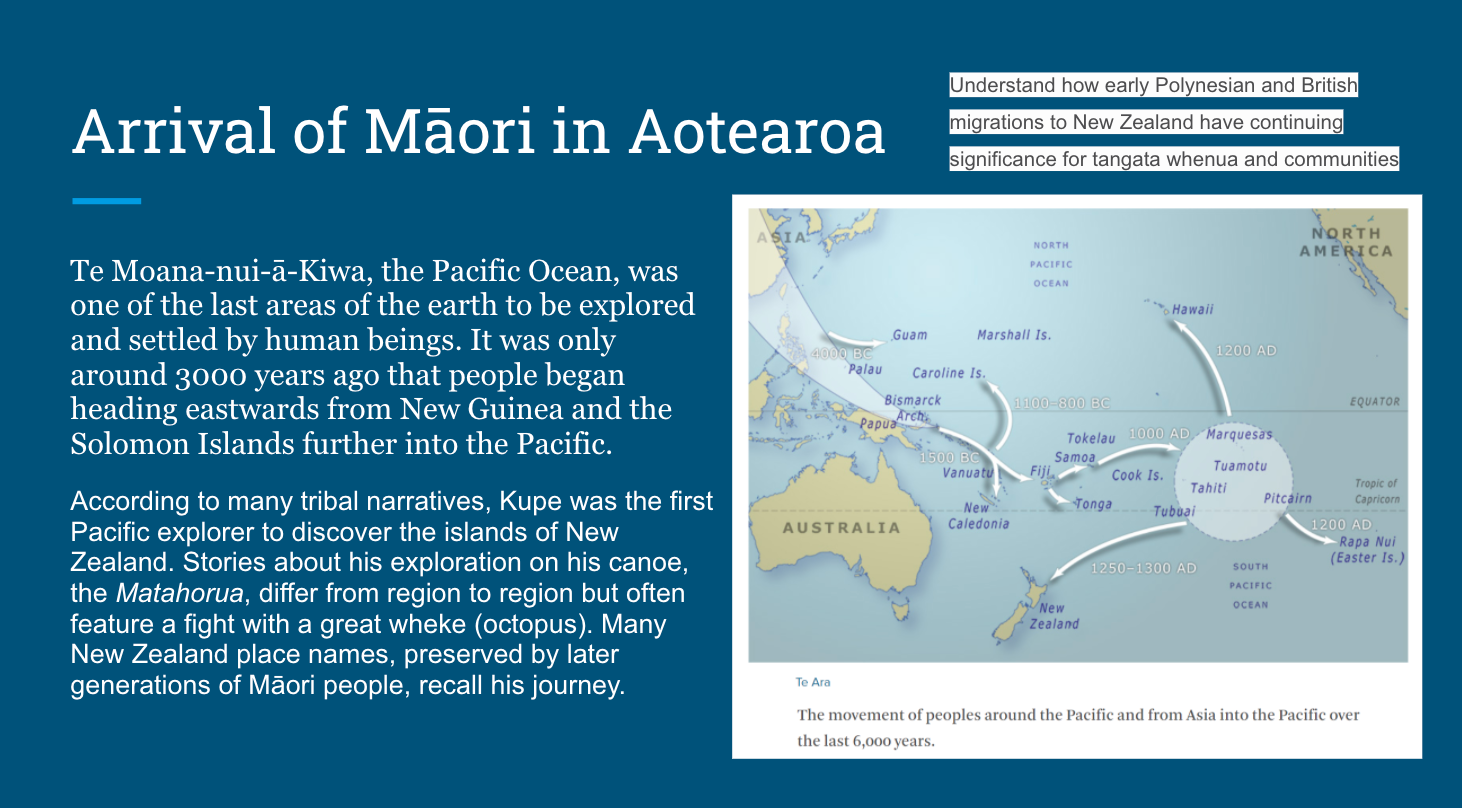
Success Criteria: I can use my note taking skills to record 5 facts or interesting information that I have learned by watching the videos. (Please refer to our Google Classroom) for videos.
Activities:
- Watch the video: Kupe: Voyaging by the Stars. Record 5 facts or interesting information, in your Global Studies book, that you learned while watching the video.
- Watch the video: Polynesian Discovery Part 1. Record 5 facts or interesting information, in your Global Studies book, that you learned while watching the video.
Optional Extra:
Research and complete the Weekly Quiz in your Global Studies book. ((Please refer to our Google Classroom)
-
EXPLORE / TŪHURA learning intentions:
- We are EXPLORING how Polynesian explorers navigated the Pacific and how they came to discover and settle in New Zealand.
Kia ora 7C2,
We are EXPLORING...how Polynesian explorers navigated the Pacific and how they came to discover and settle in New Zealand.
After reflecting on the videos that you watched during lockdown, you are required to create a visual storyboard to enrich the text about how Kupe discovered New Zealand.
Please refer to resources on our Google Classroom.
https://classroom.google.com/w/MjY3NzI0ODExNTY1/tc/Mjc4NzM3NTI0OTI5



-
PLAN & DO / WHAKAMAHI learning intentions:
- We are PLANNING... so that we can... apply our knowledge and publish your work about how Polynesian explorers navigated the Pacific and how they came to discover and settle in New Zealand.
Kia ora 7C2,
During our session today you are required to complete your work on Google classroom on Polynesian Navigation.

Next you need to ensure that your work on "Introducing Myself" is uploaded on Google Classroom please.
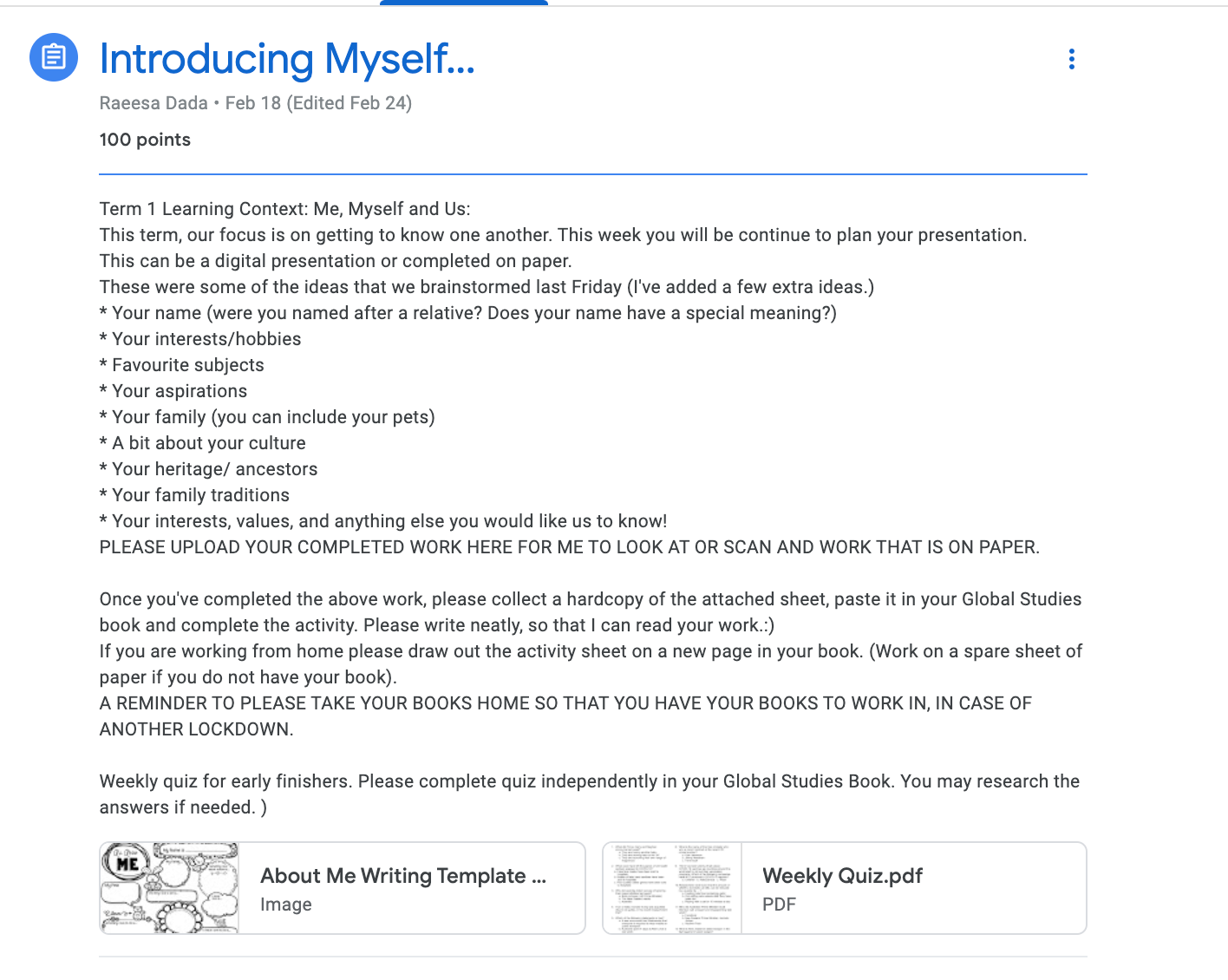

Once you have completed the above work, please start working on your eLearning ie. your ePassports or Reading Plus.
We will be missing our eLearning session on Friday as you will be having Focus Friday time with Mr McKimmon and your camp leaders, to prepare for camp.
Well done to all students who have completed your Reading Plus work! A letter will be going home today. :)
-
CAMP THIS WEEK.....

-
Kia ora 7C2,
EXPLORE / TŪHURA learning intentions:
- EXPLORE / TŪHURA learning intentions:
- We are EXPLORING...to investigate students personalised immigration story and the vocabulary associated with this idea
- We are EXPLORING...to research the Treaty of Waitangi and its significance for us today in NZ
- We are Exploring to research the cultural identity of Maori and British cultures from the past to the present
For this week we will recap the Treaty of Waitangi and explore how our values may link to the treaty.
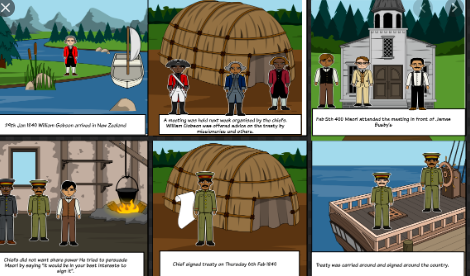
Success Criteria: I can/have...
- Researched the cultural identity of Maori and British cultures from the past to the present
- Explore early settlers and the Treaty of Waitangi and share your values that connect with the Treaty
Activities:
Watch video on Early Maori cultures in NZ and answer the following questions:
- When did Maori people arrive in NZ and from which locations in the world.
- How did they arrive here.
- Describe the waka. Discuss the types of tribes found at that time and where did they settle.
- Discuss the foods Maori eat and how they collected as well as prepared traditional foods.
- Show the cultural dress/ music/ art and dance that is symbolic to them.
- What are the languages spoken.
- Examine the conflict between British and Maori people. Also explain with images the meaning of the treaty of Waitaingi.
- Do you think Maori cultures identity today is the same from few hundred years ago. Explain.
- How has the "west" influenced local Maori Identity.
- How does this treaty have greater significance to our multi- cultural society today. Think of values and connect your reasons to this.This must be explored in good detail.
Resources:
Treaty of Waitangi: What was lost | Stuff.co.nz
The Maori - New Zealand in History
history-nz.org/maori.htmlwww.canva.com › create › storyboardsFree Online Storyboard Maker: Design a Custom Storyboard ...
Early Finishers:We have been exploring Ancient Polynsian migration to New Zealand. Using our class notes (in exercise books) and resources on our google classroom, write a story.
You should tell the story of a person leaving their island to migrate to a new land - New Zealand! You should write in the first person, from the point of view of this person.
Include the following aspects and add descriptions to your writing to bring the story alive:
leaving your home
the journey at sea (include what you know about the canoes - wa’a kaulua - and navigation)
your first impressions of the land as you approach Aotearoa
what happens when you land?
setting up your shelters and exploring on your first day
end your story as the sun sets on your first day in Aotearoa
- EXPLORE / TŪHURA learning intentions:
-
PLAN & DO / WHAKAMAHI learning intentions:
- We are PLANNING... to apply our knowledge and research about how Polynesian explorers navigated the Pacific and how they came to discover and settle in New Zealand.
- We are PLANNING... by applying our knowledge to create a digital book showing our understanding of The Treaty of Waitangi.
Kia ora 7C2,
Continuation of last week as we missed our Friday session due to Good Friday - and part of our session on Monday due to the fire alarm and evacuation!
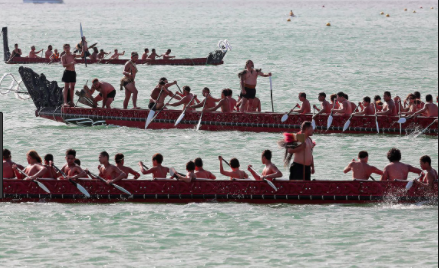
Success Criteria: I can/have...
- Researched the cultural identity of Maori and British cultures from the past to the present
- creatively design our project boards
Activities:
- Watch video on Early Maori cultures in NZ and answer the following questions:
- When did Maori people arrive in NZ and from which locations in the world.
- How did they arrive here. Describe the waka.
- Discuss the types of tribes found at that time and where did they settle.
- Discuss the foods Maori eat and how they collected as well as prepared traditional foods. Show the cultural dress/ music/ art and dance that is symbolic to them. What are the languages spoken.
- Examine the conflict between British and Maori people.Also explain with images the meaning of the treaty of Waitaingi.
- Do you think Maori cultures identity today is the same from few hundred years ago. Explain. Also show how the "west has influenced local Maori Identity.
- how does this treaty have greater significance to our multi- cultural society today. Think of values and connect your reasons to this.
- Complete the design of your own Treaty showing the values and ethics. This can be added to your storyboard created last week.
Resources:
The Maori - New Zealand in History
history-nz.org/maori.htmlEarly settlement - The arrival of Maori - NewZealand.com
Maori Foods & Recipes | Resources | New Zealand Now
https://www.newzealandnow.govt.nz/resources/maori-foods-and-recipesMāori clothing and adornment – kākahu Māori – Te Ara Encyclopedia ...
www.teara.govt.nz/en/maori-clothing-and-adornment-kakahu-maoriNgāpuhi war canoe at Waitangi | NZHistory, New Zealand history online
-
FOCUS / ARONGA learning intentions:
- We are FOCUSING on Explaining our understanding of The Treaty of Waitangi.
Kia ora 7C2,Please find information below about our first assessment.
Please remember that we will be working on this during class time.
This assessment will be due at the end of Week 2, Term 2. :)
Task Instructions:
Imagine that you are the President of the MHJC Global Studies Club. You are responsible for creating a digital information book for our future Year 7 students that will explore reasons why the Treaty of Waitangi was signed.
Working individually, you are required to select 2 ideas that you would like to research, from the list below.
All students will also need to complete a diary entry. The structure of your diary entry will be discussed in more detail during your English session.
Rubric - Global Studies
Research skills
You have more than one source to gather historical facts on the Treaty of Waitangi
You identified more than one source to gather historical facts on the treaty of Waitangi
You have used different sources with a good description of this historical event and provided a bibliography
You have used a number of different sources and provided good understanding of this historical event, accurately formatted bibliography
Creativity and Teamwork
You have attempted to produce a visual source that will pass on and sustain NZ’s cultural heritage
You have attempted to work within a group to produce a visual source that will pass on and sustain NZ’s cultural heritage
You have successfully worked within a group to produce a visual source that will pass on and sustain NZ’s cultural heritage
You have successfully worked within a group to produce an engaging visual source that will pass on and sustain NZ’s cultural heritage
Reasons for the Treaty of Waitangi
You have yet to use historical facts to identify why different groups wanted/did not want a Treaty
You have used historical facts to identify why different groups wanted/did not want a Treaty
You have used historical facts to describe why different groups wanted/did not want a Treaty
You have used historical facts to explain why different groups wanted/did not want a Treaty
Time Management
You have yet to complete and submit your assessment
You have submitted your assessment late
You have submitted your assessment by the due date on …..
You have submitted your assessment by the due date on …..
Overall
WORKING TOWARDS Curriculum expectation
Working AT curriculum expectation
Working ABOVE curriculum expectation
Working BEYOND curriculum expectation
Instructions for Global Studies Assessment:
Working individually, create an information book that describes the historical event that led to the signing of the Treaty of Waitangi and the significance of this event today.
Each digital booklet will include:
An introduction explaining Waitangi Day and the significance of this important day
Select two ideas from the list following:
Early Maori cultures in NZ
British and Maori Conflict
British Governor William Hobson
Maori Chiefs and Hone Heke
Signing Ceremony( debate/ pros and cons)
Treaty of Waitangi ( values and meaning)
Treaty Significance today
A conclusion expressing your thoughts about Waitangi Day and the significance of this important day.
Your digital book must be creatively designed and there must be evidence from at least 3 resources.
Format for your assessment will be:
Introduction
Research topic 1
Research topic 2
Conclusion
Diary entry (English)
Bibliography
A reminder that all resources are on MHOL and Google Classroom.:)
-
Kia ora 7C2,
Welcome to Term 2,

You will continue to work on your assessment for the next 2 weeks.
FOCUS / ARONGA learning intentions:
- We are FOCUSING on Explaining our understanding of The Treaty of Waitangi.
Kia ora 7C2,
Please find information below about our first assessment.
Please remember that we will be working on this during class time.
This assessment will be due at the end of Week 2, Term 2. :)
Instructions for Global Studies Assessment:
Working individually, create an information book that describes the historical event that led to the signing of the Treaty of Waitangi and the significance of this event today.
Each digital booklet will include:
An introduction explaining Waitangi Day and the significance of this important day
Select two ideas from the list following:
Early Maori cultures in NZ
British and Maori Conflict
British Governor William Hobson
Maori Chiefs and Hone Heke
Signing Ceremony( debate/ pros and cons)
Treaty of Waitangi ( values and meaning)
Treaty Significance today
A conclusion expressing your thoughts about Waitangi Day and the significance of this important day.
Your digital book must be creatively designed and there must be evidence from at least 3 resources.
Format for your assessment will be:
Introduction
Research topic 1
Research topic 2
Conclusion
Diary entry (English)
Bibliography
Rubric - Global Studies
Research skills
You have more than one source to gather historical facts on the Treaty of Waitangi
You identified more than one source to gather historical facts on the treaty of Waitangi
You have used different sources with a good description of the selected historical events and provided a bibliography
You have used a number of different sources and provided good understanding of the selected historical events and provided a bibliography
Creativity
You have not attempted to produce a visual source that will pass on and sustain NZ’s cultural heritage
You have attempted to produce a visual source that will pass on and sustain NZ’s cultural heritage
You have successfully worked to produce a visual source that will pass on and sustain NZ’s cultural heritage
You have successfully worked to produce an engaging visual source that will pass on and sustain NZ’s cultural heritage
Reasons for the Treaty of Waitangi
You have yet to use historical facts to identify why different groups wanted/did not want a Treaty
You have used historical facts to identify why different groups wanted/did not want a Treaty
You have used historical facts to describe why different groups wanted/did not want a Treaty
You have used historical facts to explain why different groups wanted/did not want a Treaty
Time Management
You have yet to complete and submit your assessment
You have submitted your assessment late
You have submitted your assessment by the due date on 19 May 2021
You have submitted your assessment by the due date on 19 May 2021
Overall
WORKING TOWARDS Curriculum expectation
Working AT curriculum expectation
Working ABOVE curriculum expectation
Working BEYOND curriculum expectation
A reminder that all resources are on MHOL and Google Classroom.:)
-
Kia ora 7C2,
We will continue to work on our assessment this week.
FOCUS / ARONGA learning intentions:
- We are FOCUSING on Explaining our understanding of The Treaty of Waitangi.
Please find information below about our first assessment.
Please remember that we will be working on this during class time.
This assessment will be due at the end of Week 3, Term 2. :)
Instructions for Global Studies Assessment:
Working individually, create an information book that describes the historical event that led to the signing of the Treaty of Waitangi and the significance of this event today.
Each digital booklet will include:
Format for your assessment will be:
Introduction: Explaining Waitangi Day and the significance of this important day
Research topic 1 : Self selected
Research topic 2 : Self selected
Conclusion :Expressing your thoughts about Waitangi Day and the significance of this important day.
- Diary entry (English) - Use your researched information to write your diary entry.
Bibliography
Select two ideas from the list following:
Early Maori cultures in NZ
British and Maori Conflict
British Governor William Hobson
Maori Chiefs and Hone Heke
Signing Ceremony( debate/ pros and cons)
Treaty of Waitangi ( values and meaning)
Treaty Significance today
Your digital book must be creatively designed and there must be evidence from at least 3 resources.
Rubric - Global Studies
Research skills
You have more than one source to gather historical facts on the Treaty of Waitangi
You identified more than one source to gather historical facts on the treaty of Waitangi
You have used different sources with a good description of the selected historical events and provided a bibliography
You have used a number of different sources and provided good understanding of the selected historical events and provided a bibliography
Creativity
You have not attempted to produce a visual source that will pass on and sustain NZ’s cultural heritage
You have attempted to produce a visual source that will pass on and sustain NZ’s cultural heritage
You have successfully worked to produce a visual source that will pass on and sustain NZ’s cultural heritage
You have successfully worked to produce an engaging visual source that will pass on and sustain NZ’s cultural heritage
Reasons for the Treaty of Waitangi
You have yet to use historical facts to identify why different groups wanted/did not want a Treaty
You have used historical facts to identify why different groups wanted/did not want a Treaty
You have used historical facts to describe why different groups wanted/did not want a Treaty
You have used historical facts to explain why different groups wanted/did not want a Treaty
Time Management
You have yet to complete and submit your assessment
You have submitted your assessment late
You have submitted your assessment by the due date on 19 May 2021
You have submitted your assessment by the due date on 19 May 2021
Overall
WORKING TOWARDS Curriculum expectation
Working AT curriculum expectation
Working ABOVE curriculum expectation
Working BEYOND curriculum expectation
A reminder that all resources are on MHOL and Google Classroom.:)
-
Kia ora 7C2,
You have 1 more week to work on your Global Studies assessment. This is due on Thursday 27 May. Please ensure that your work is uploaded by the end of your English session...session 5 , if you are going to be away on Thursday - otherwise your work will be graded as a late submission.
FOCUS / ARONGA learning intentions:
- We are FOCUSING on Explaining our understanding of The Treaty of Waitangi.
Please find information below about our first assessment.
Please remember that we will be working on this during class time.
This assessment will be due at the end of Week 3, Term 2. :)
Instructions for Global Studies Assessment:
Working individually, create an information book that describes the historical event that led to the signing of the Treaty of Waitangi and the significance of this event today.
Each digital booklet will include:
Format for your assessment will be:
Introduction: Explaining Waitangi Day and the significance of this important day
Research topic 1 : Self selected
Research topic 2 : Self selected
Conclusion :Expressing your thoughts about Waitangi Day and the significance of this important day.
- Diary entry (English) - Use your researched information to write your diary entry.
Bibliography
Select two ideas from the list following:
Early Maori cultures in NZ
British and Maori Conflict
British Governor William Hobson
Maori Chiefs and Hone Heke
Signing Ceremony( debate/ pros and cons)
Treaty of Waitangi ( values and meaning)
Treaty Significance today
Your digital book must be creatively designed and there must be evidence from at least 3 resources.
Rubric - Global Studies
Research skills
You have more than one source to gather historical facts on the Treaty of Waitangi
You identified more than one source to gather historical facts on the treaty of Waitangi
You have used different sources with a good description of the selected historical events and provided a bibliography
You have used a number of different sources and provided good understanding of the selected historical events and provided a bibliography
Creativity
You have not attempted to produce a visual source that will pass on and sustain NZ’s cultural heritage
You have attempted to produce a visual source that will pass on and sustain NZ’s cultural heritage
You have successfully worked to produce a visual source that will pass on and sustain NZ’s cultural heritage
You have successfully worked to produce an engaging visual source that will pass on and sustain NZ’s cultural heritage
Reasons for the Treaty of Waitangi
You have yet to use historical facts to identify why different groups wanted/did not want a Treaty
You have used historical facts to identify why different groups wanted/did not want a Treaty
You have used historical facts to describe why different groups wanted/did not want a Treaty
You have used historical facts to explain why different groups wanted/did not want a Treaty
Time Management
You have yet to complete and submit your assessment
You have submitted your assessment late
You have submitted your assessment by the due date on 19 May 2021
You have submitted your assessment by the due date on 19 May 2021
Overall
WORKING TOWARDS Curriculum expectation
Working AT curriculum expectation
Working ABOVE curriculum expectation
Working BEYOND curriculum expectation
A reminder that all resources are on MHOL and Google Classroom.:)
-
Kia ora 7C2,
This is the last week for your Global Studies assessment. This is due on Thursday 27 May. Please ensure that your work is uploaded by the end of your English session...session 5 , if you are going to be away on Thursday - otherwise your work will be graded as a late submission.
FOCUS / ARONGA learning intentions:
- We are FOCUSING on Explaining our understanding of The Treaty of Waitangi.
Please find information below about our first assessment.
Please remember that we will be working on this during class time.
This assessment will be due at the end of Week 3, Term 2. :)
Instructions for Global Studies Assessment:
Working individually, create an information book that describes the historical event that led to the signing of the Treaty of Waitangi and the significance of this event today.
Each digital booklet will include:
Format for your assessment will be:
Introduction: Explaining Waitangi Day and the significance of this important day
Research topic 1 : Self selected
Research topic 2 : Self selected
Conclusion :Expressing your thoughts about Waitangi Day and the significance of this important day.
- Diary entry (English) - Use your researched information to write your diary entry.
Bibliography
Select two ideas from the list following:
Early Maori cultures in NZ
British and Maori Conflict
British Governor William Hobson
Maori Chiefs and Hone Heke
Signing Ceremony( debate/ pros and cons)
Treaty of Waitangi ( values and meaning)
Treaty Significance today
Your digital book must be creatively designed and there must be evidence from at least 3 resources.
Rubric - Global Studies
Research skills
You have more than one source to gather historical facts on the Treaty of Waitangi
You identified more than one source to gather historical facts on the treaty of Waitangi
You have used different sources with a good description of the selected historical events and provided a bibliography
You have used a number of different sources and provided good understanding of the selected historical events and provided a bibliography
Creativity
You have not attempted to produce a visual source that will pass on and sustain NZ’s cultural heritage
You have attempted to produce a visual source that will pass on and sustain NZ’s cultural heritage
You have successfully worked to produce a visual source that will pass on and sustain NZ’s cultural heritage
You have successfully worked to produce an engaging visual source that will pass on and sustain NZ’s cultural heritage
Reasons for the Treaty of Waitangi
You have yet to use historical facts to identify why different groups wanted/did not want a Treaty
You have used historical facts to identify why different groups wanted/did not want a Treaty
You have used historical facts to describe why different groups wanted/did not want a Treaty
You have used historical facts to explain why different groups wanted/did not want a Treaty
Time Management
You have yet to complete and submit your assessment
You have submitted your assessment late
You have submitted your assessment by the due date on 19 May 2021
You have submitted your assessment by the due date on 19 May 2021
Overall
WORKING TOWARDS Curriculum expectation
Working AT curriculum expectation
Working ABOVE curriculum expectation
Working BEYOND curriculum expectation
A reminder that all resources are on MHOL and Google Classroom.:)
-
Kia ora 7C2,
We will only be having 1 session this week Monday. Now that all assessments have been submitted we will be able to get back to our routine of our General Knowledge Quiz! :)
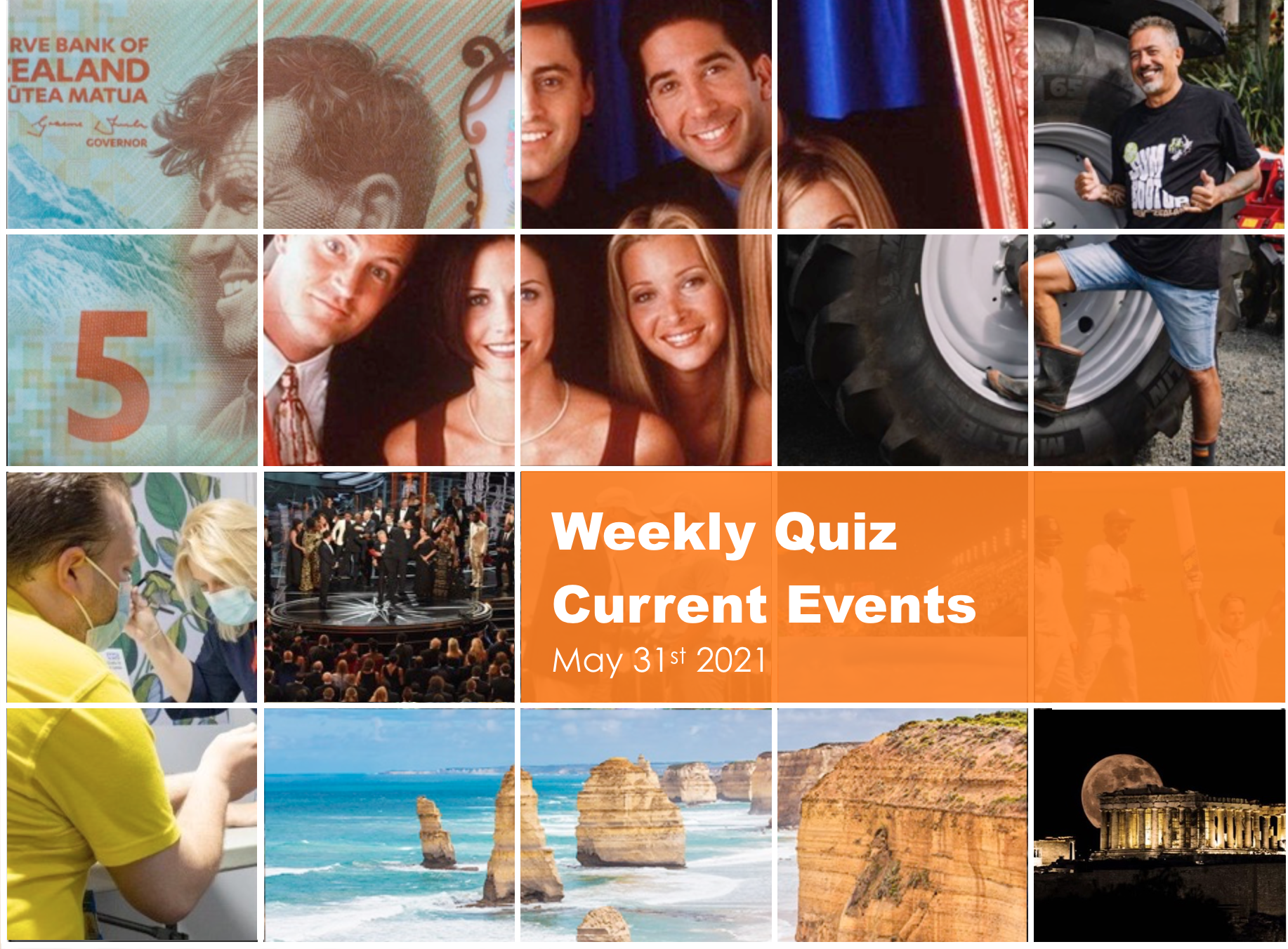
On Wednesday will be our visit to the Auckland Museum where we will be looking at increasing our knowledge about the Polynesian Explorers.
Focus Friday :
Please complete the Treaty recap questions on Google Classroom. Please ensure that this is completed before our next session.
-
Kia ora 7C2,
Due to our class trips and a shorter week, we will be missing our Global Studies sessions this week.
-
Kia ora 7C2,
As discussed in class, it is your turn to become the expert and share your information with the class. As a group you will research your topic and plan a mini - lesson to share with the rest of the class.
7C2 Groups : You will have Wednesday and one session on Friday FFR to complete this activity
Lessons begin on Monday. All students must have a turn to be involved in the planning and presentation of the lesson.Group 1: Daily life in early Māori communities: Rylee, Addie, Prabvir, Pranav
Draw and illustrate a timeline to show a day in the life of a person in an early Māori community.
Use information from the website below.
https://teara.govt.nz/en/daily-life-in-maori-communities-te-noho-a-te-hapori/page-1
Group 2: The Dawn Raids: Namah, Ekam, Admin, Elijah
https://nzhistory.govt.nz/culture/dawn-raids
Group 3: Early buildings: Zara, Catherine, Reid, Fontaine
Create a drawing depicting an early Māori settlement before Europeans arrived. Use the information on the website below:
https://teara.govt.nz/en/maori-architecture-whare-maori/page-1
Group 4: Early trade in New Zealand: Keenan, Samuel, Allegra,Yara
Using a map of New Zealand as the main image for your information poster, show the traded items and where they came from. Add details such as what the stones were used for
Group 5: Marae: Lacey, Nishu, Jimmy, Jaira
Create an information poster, using an image of the marae buildings as your dominant image. Label the buildings and parts of the buildings and explain what each building/ structure was used for/ represents.
Use this to help you: https://teara.govt.nz/en/maori-architecture-whare-maori/page-3
Group 6: NZ Wars : Azekiel, Joban, Isabella, Puneet
Design an information poster to teach your peers about how early Māori settlers gathered and stored food.
https://nzhistory.govt.nz/war/new-zealands-19th-century-wars/introduction
Group 7: Tools : Lucky, Mahi, Linda, Boaz
Design an information poster to teach your peers about early Māori tools
https://teara.govt.nz/en/kohatu-maori-use-of-stone/page-1
This must be digitally presented.
Please see me if you require any support. :)
-
FOCUS / ARONGA learning intentions:
- We are FOCUSING. on presenting our expert topics to our class.
- We are FOCUSING... on our research skills.
Kia ora 7C2,
This week we will begin with your group presentations.
As discussed in class, it is your turn to become the expert and share your information with the class. As a group you will research your topic and plan a mini - lesson to share with the rest of the class.
7C2 Groups : You will have Wednesday and one session on Friday FFR to complete this activity
Lessons begin on Monday. All students must have a turn to be involved in the planning and presentation of the lesson.Group 1: Daily life in early Māori communities: Rylee, Addie, Prabvir, Pranav
Draw and illustrate a timeline to show a day in the life of a person in an early Māori community.
Use information from the website below.
https://teara.govt.nz/en/daily-life-in-maori-communities-te-noho-a-te-hapori/page-1
Group 2: The Dawn Raids: Namah, Ekam, Admin, Elijah
https://nzhistory.govt.nz/culture/dawn-raids
Group 3: Early buildings: Zara, Catherine, Reid, Fontaine
Create a drawing depicting an early Māori settlement before Europeans arrived. Use the information on the website below:
https://teara.govt.nz/en/maori-architecture-whare-maori/page-1
Group 4: Early trade in New Zealand: Keenan, Samuel, Allegra,Yara
Using a map of New Zealand as the main image for your information poster, show the traded items and where they came from. Add details such as what the stones were used for
Group 5: Marae: Lacey, Nishu, Jimmy, Jaira
Create an information poster, using an image of the marae buildings as your dominant image. Label the buildings and parts of the buildings and explain what each building/ structure was used for/ represents.
Use this to help you: https://teara.govt.nz/en/maori-architecture-whare-maori/page-3
Group 6: NZ Wars : Azekiel, Joban, Isabella, Puneet
Design an information poster to teach your peers about how early Māori settlers gathered and stored food.
https://nzhistory.govt.nz/war/new-zealands-19th-century-wars/introduction
Group 7: Tools : Lucky, Mahi, Linda, Boaz
Design an information poster to teach your peers about early Māori tools
https://teara.govt.nz/en/kohatu-maori-use-of-stone/page-1
This must be digitally presented.
Please see me if you require any support. :)
-
Kia ora 7C2,

Our focus for this week is MATARIKI. Please refer to our Google Classroom for resources.
What is Matariki?
Matariki is one of the most important Māori celebrations. It signifies the start of the New Year in Māori culture.
Matariki is the name for a star cluster also known as the Pleiades, that rises in late June or early July. It literally translates in English to the 'eyes of god' or 'little eyes'.
When is Matariki?
In 2021 Matariki will be celebrated between 19 June to 11 July.
Whakanuia te tau hou Māori, 19 o Pipiri ki 11 o Hōngongoi 2021.
How is Matariki celebrated?
Traditionally, Māori believed if the Matariki stars were very bright in the sky, this signified a warmer season and more fruitful crops for harvest.
It was seen as an ideal time for ceremonial offerings to the Māori land-based gods Rongo, Uenuku and Whiro to ensure their crops were healthy for the coming year. Matariki was also seen as an important time for family to gather and reflect on the past and the future.
Today Matariki celebrates the unique place in which we live and gives respect to the land we live on. This is celebrated through education and remembering whakapapa (ancestry).
The planting of new trees and crops is done to represent new beginnings.
Celebrations traditionally last up to 3 days after the new moon has risen following the Matariki clusters visibility in the sky.
What are the Matariki stars called?
Matariki is a star cluster, not a constellation. The 9 Matariki stars are called:
- Hiwa-i-te-rangi
- Matariki
- Pohutukawa
- Tupu-a-nuku
- Tupu-a-rangi
- Ururangi
- Waipuna-a-rangi
- Waiti
- Waita
-
Kia ora 7C2,
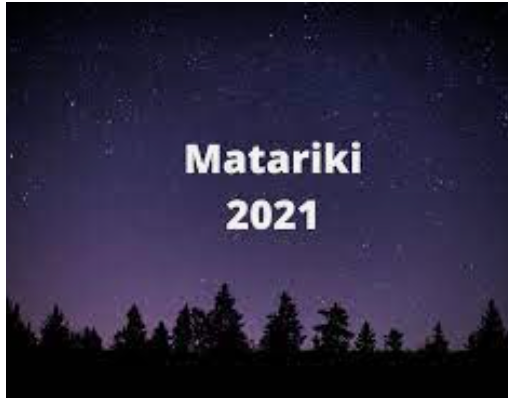
This week you will all share your research and Matariki presentations that you started working on last week.
-

Kia ora 7C2,
EXPLORE / TŪHURA learning intentions:
- We are EXPLORING...cultures across the world.
- We are EXPLORING...landmarks.
- We are EXPLORING...our research skills.
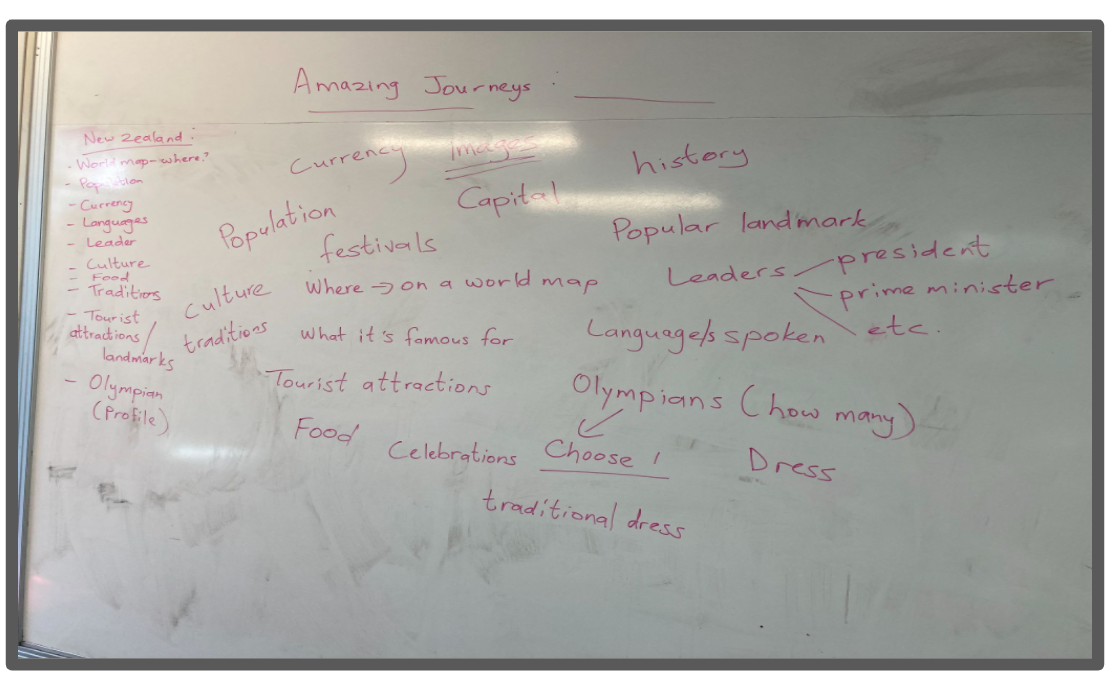
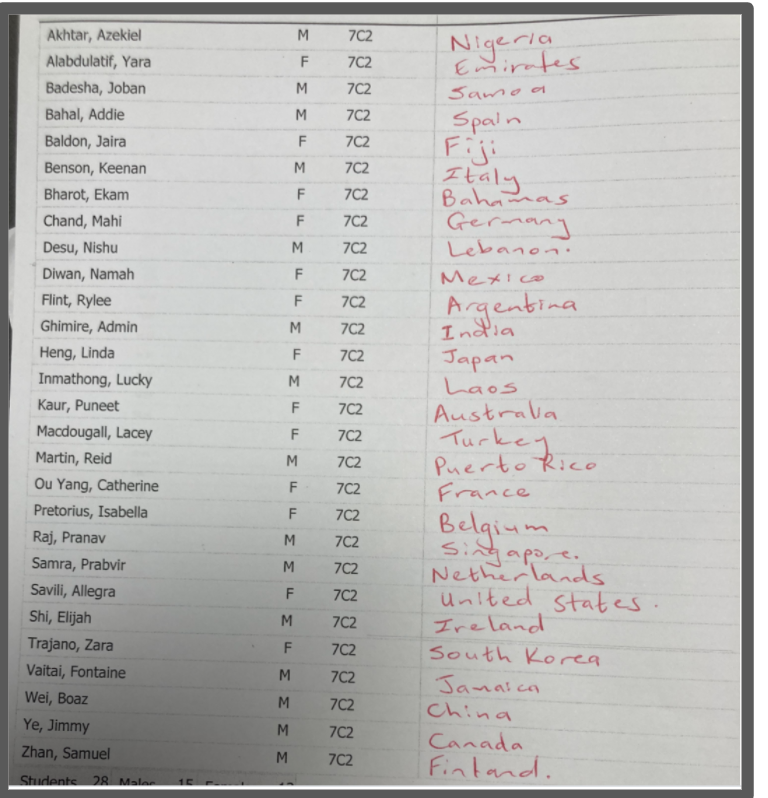
As discussed in class, our context this term is Amazing Journeys. The countries that you will be researching this term is also linked to the Olympics. We will all start off by researching New Zealand . Please refer to our class brainstorm above.:)
Starting next week, one of our sessions each week will be used to focus on Mapping.

-
Kia ora 7C2,
EXPLORE / TŪHURA learning intentions:
- We are EXPLORING...cultures across the world.
- We are EXPLORING...landmarks.
- We are EXPLORING...our research skills.
-
Kia ora 7C2,EXPLORE / TŪHURA learning intentions:
- We are EXPLORING...cultures across the world.
- We are EXPLORING...landmarks.
- We are EXPLORING...our research skills.
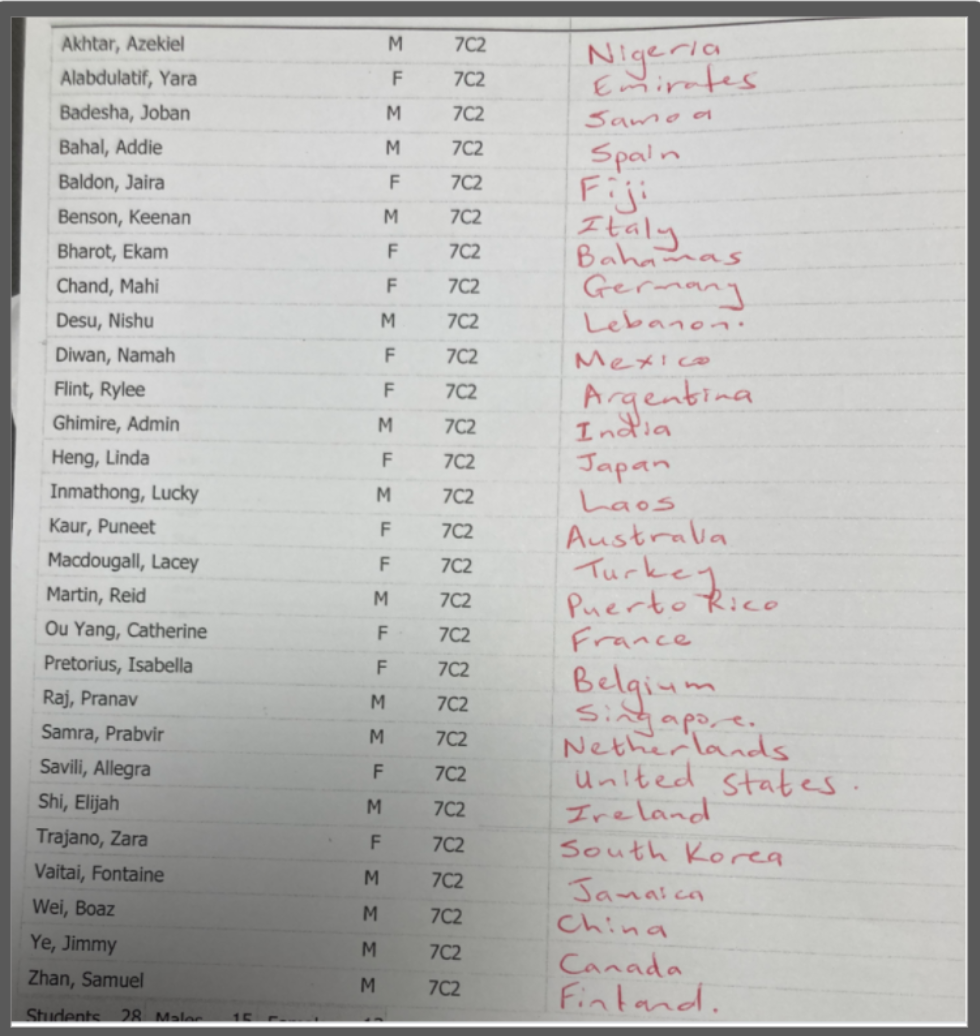
-
Kia ora students,
We will continue with your presentations of your country research from Monday.
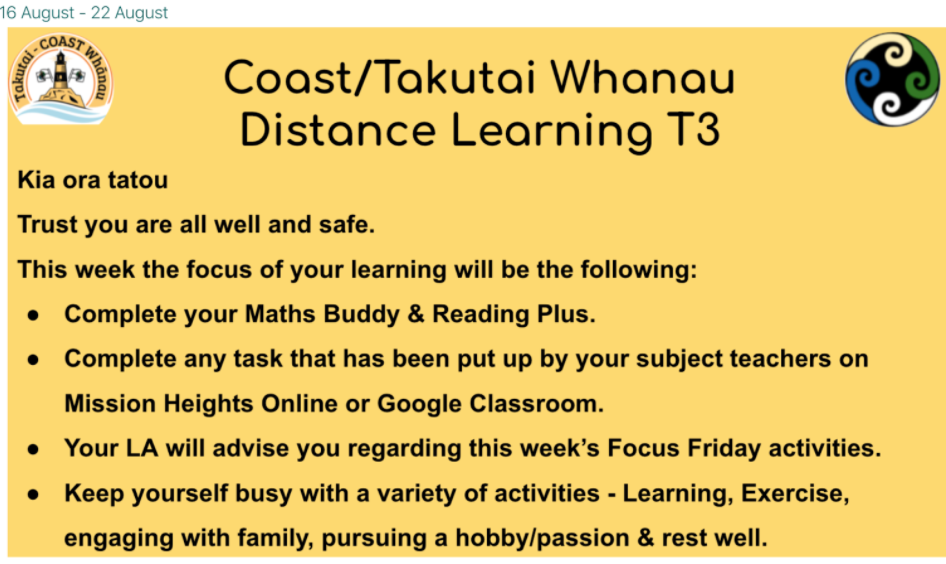
-
Kia ora 7C2,
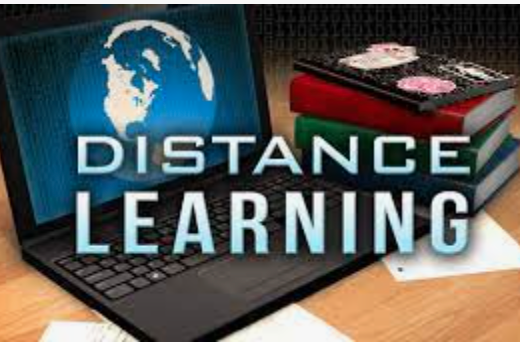
I hope that you and your families are keeping well and safe.
For the rest of this term we will be learning about mapping skills and direction.
You have our 3 Global Studies sessions for the week to complete the activities below and the activities on our Google Classroom.
EXPLORE / TŪHURA learning intentions:
- We are EXPLORING our Mapping skills.
- We are EXPLORING the use of compass directions.
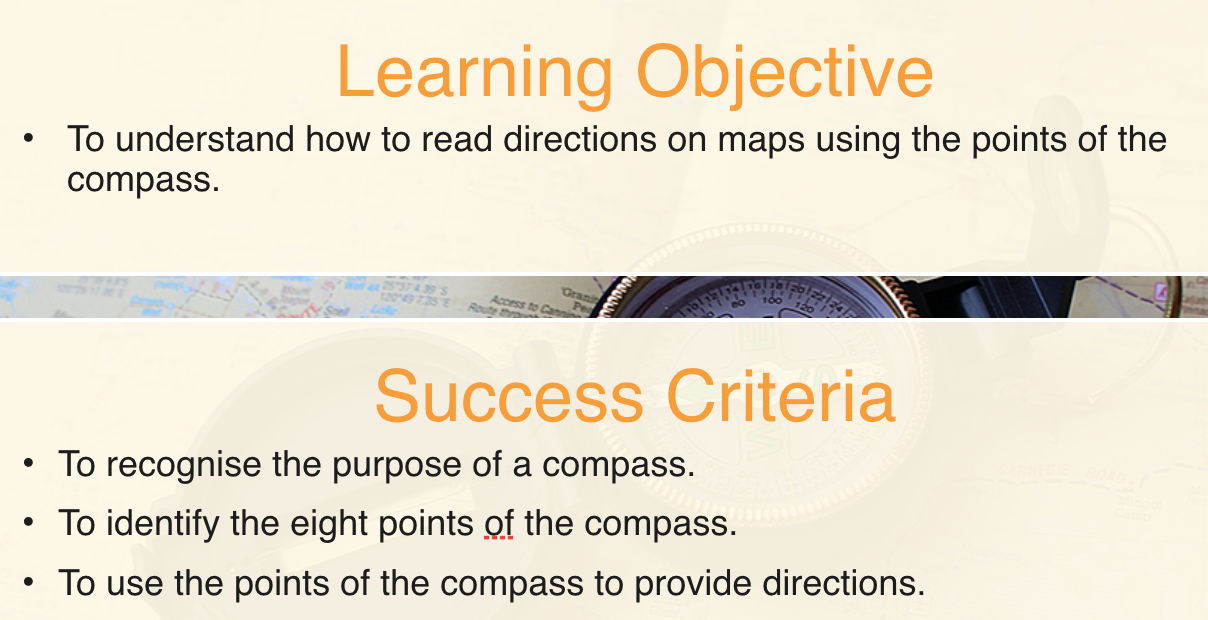
Activities:
Starting on a new page in your books, write down the heading Mapping Skills and Direction.Copy the Learning Objective and Success Criteria.
Next copy and answer the questions from the slide below in your Global Studies book.

For your information,

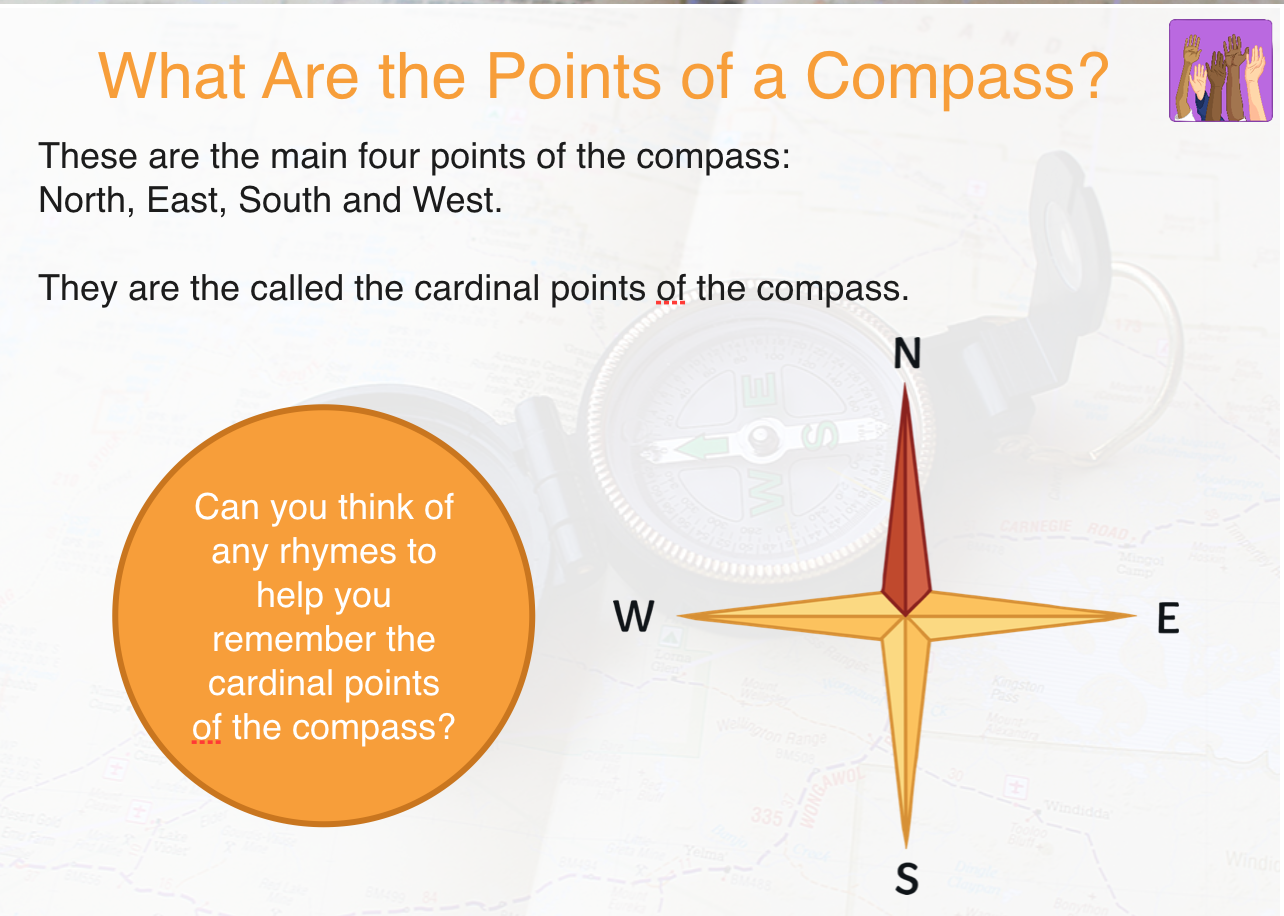
Copy the compass points image below in your book and label the compass points.
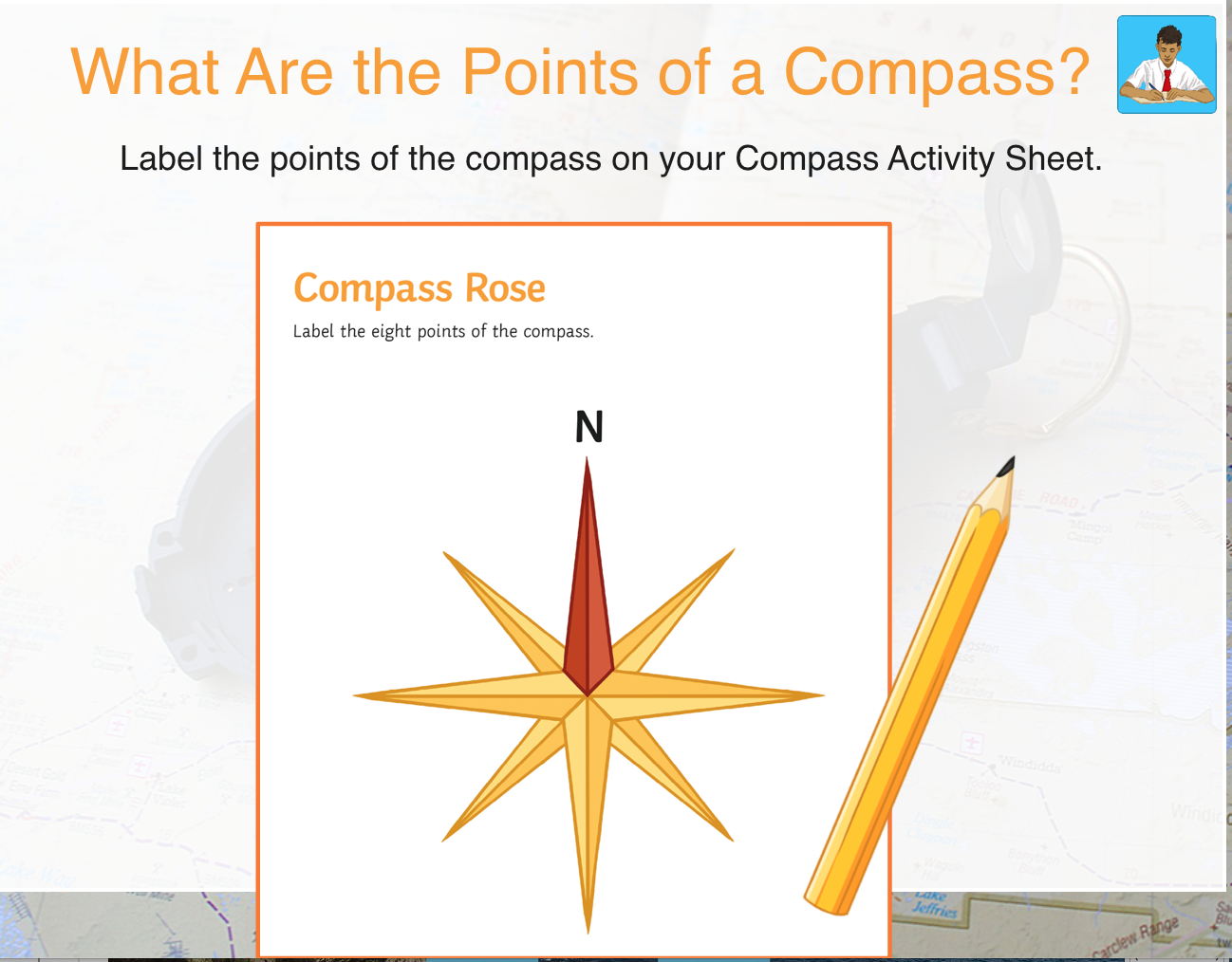
Activities:
Please refer to Google Classroom for further activities.https://classroom.google.com/u/0/w/MjY3NzI0ODExNTY1/tc/Mjc4NzM3NTI0OTI5
Please complete your Education Perfect task.
-
Kia ora 7C2,

I hope that you and your families continue to keep well and safe during our lockdown period.
As mentioned last week, for the rest of this term we will be learning about mapping skills and direction.
You have our 3 Global Studies sessions for the week to complete the activities below and the activities on our Google Classroom.
Before you complete your tasks for this week, please ensure that you use the answers on Google Classroom to mark your tasks from last week.
I will discuss these answers during our Google Meet session on Monday at 12.30pm.

EXPLORE / TŪHURA learning intentions:
- We are EXPLORING our Mapping skills.
- We are EXPLORING your knowledge of maps.
Success Criteria: I can/have...
- Identify different types of maps.
- Follow directions.
Activities:

Please refer to Google Classroom for a map of Auckland Zoo, that you can use for the above activity.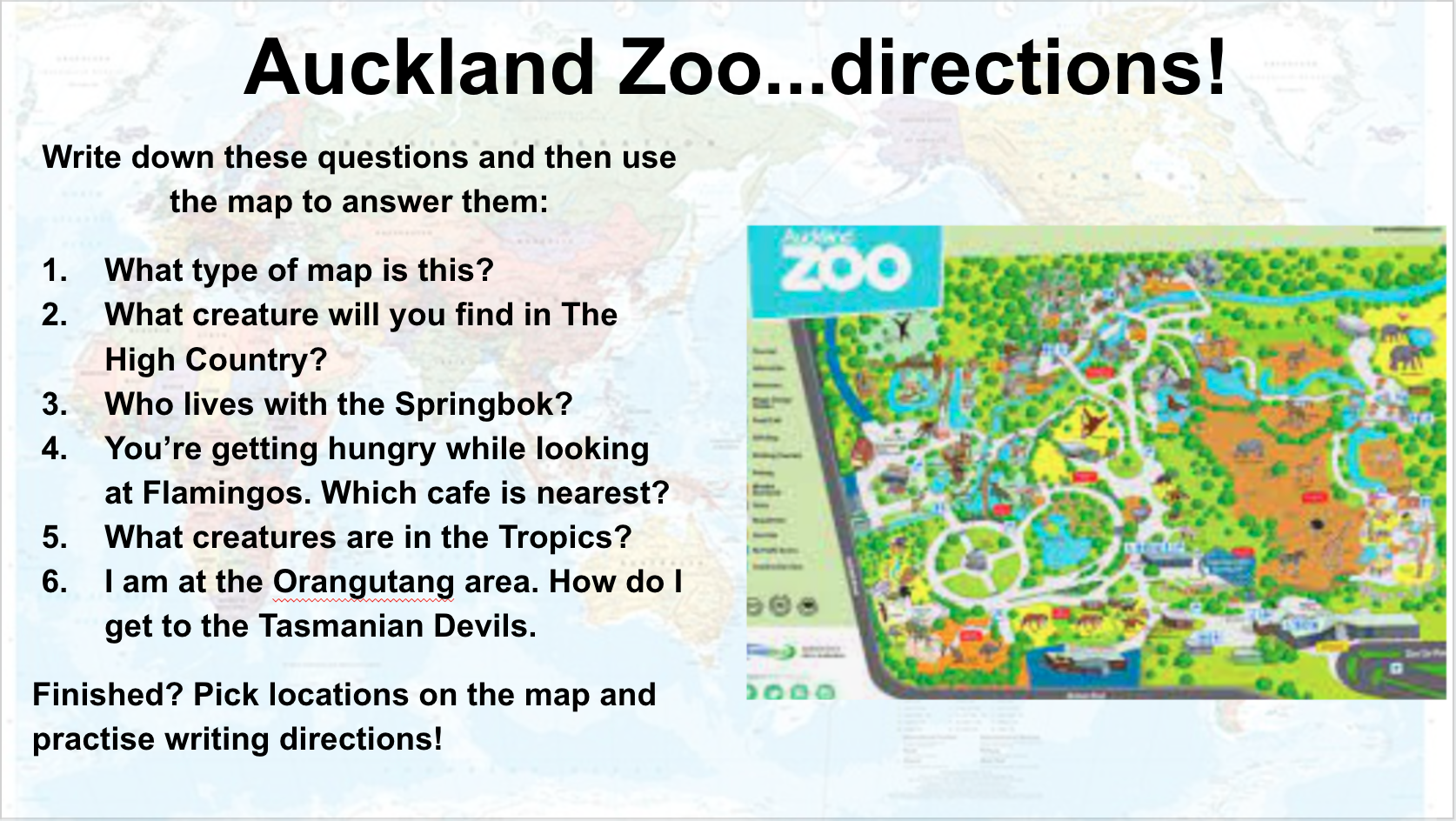
Please refer to Google Classroom for further activities.
https://classroom.google.com/u/0/w/MjY3NzI0ODExNTY1/tc/Mjc4NzM3NTI0OTI5
-

Kia ora 7C2,
FOCUS / ARONGA learning intentions:
- We are FOCUSING on applying our mapping skills.
- We are FOCUSING on explaining directions, using a map.
- We are FOCUSING on following directions and answering questions involving map work.
Success Criteria: I can/have...
- Follow directions.
- Apply my mapping skills.
Activities:
- Complete the Hopeville map challenge on Google Classroom.
https://classroom.google.com/u/0/c/MjY3NzI0ODExNTY1/a/Mzg3MzU5MzQ0NTM2/details
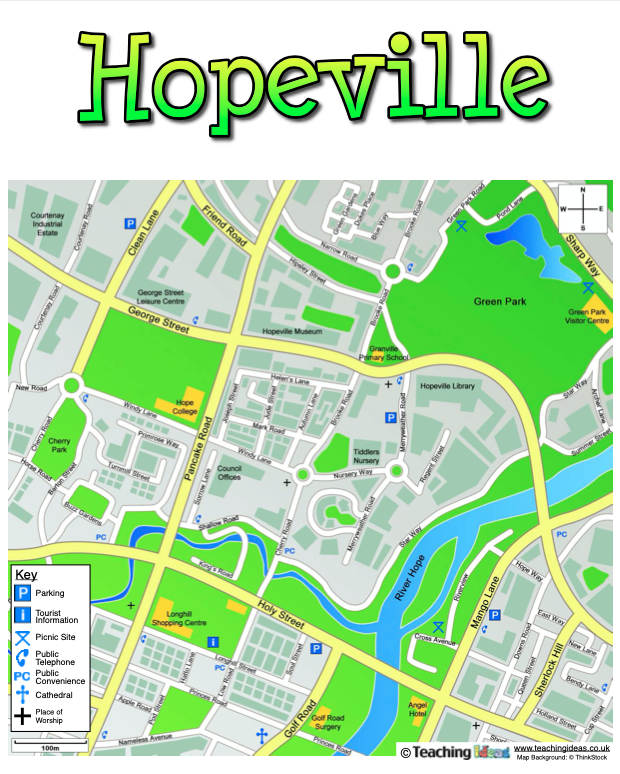
Refer to challenge cards and Map on our 7C2 Google classroom.
All weekly activities are due by 3pm on Friday and must be turned in on our 7C2 Google Classroom.
-
Kia ora 7C2,
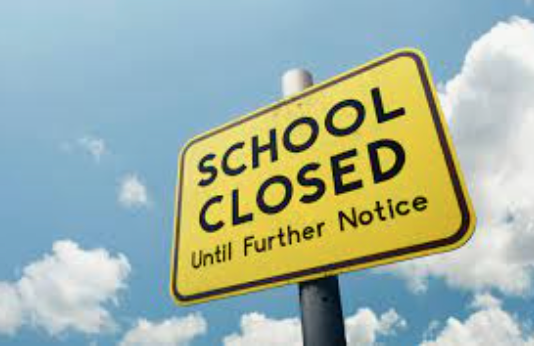
FOCUS / ARONGA learning intentions:
- We are FOCUSING on applying our mapping skills.
- We are FOCUSING on following directions
Success Criteria: I can/have...
- Follow directions.
- Apply my mapping skills.
Activities:
- Complete the Pirate map activity on Google Classroom.
https://classroom.google.com/u/0/w/MjY3NzI0ODExNTY1/tc/Mjc4NzM3NTI0OTI5

Refer to the pirate activity and the pirate activities answer sheet on our 7C2 Google classroom.
Complete your activities on the doc on Google Classroom and turn it in when completed please.
All weekly activities are due by 3pm on Friday and must be turned in on our 7C2 Google Classroom.
-
Kia ora 7C2,

FOCUS / ARONGA learning intentions:
- We are FOCUSING on applying our mapping skills.
- We are FOCUSING on following directions
Success Criteria: I can/have...
- Follow directions.
- Apply my mapping skills.
Activities:
- Complete any of your Global Studies work that you have not completed during lockdown and turn it in on Google Classroom,


Please focus on your wellbeing this week.
If you are up to date with all your work - then please take a break from your computer and do an offscreen activity of your choice. Maybe surprise someone in your bubble by doing something kind or helpful- without being asked. :)
-

Kia ora 7C2,
FOCUS / ARONGA learning intentions:
- We are FOCUSING on applying our mapping skills.
- We are FOCUSING on following directions
Success Criteria: I can/have...
- Follow directions.
- Apply my mapping skills.
Activities:
- Complete any of your Global Studies work that you have not completed during lockdown and turn it in on Google Classroom.
- Weekly Quiz on Google Classroom. The quiz for this week is a review of current events for the whole term. Please be honest with yourself and don’t peek at the answers. :)I have created a doc for each student. Please complete your quiz answers on this doc. We can complete the quiz as a class when we meet at 11am on Wednesday, 29 September. :)
https://classroom.google.com/u/0/w/MjY3NzI0ODExNTY1/tc/Mjc4NzM3NTI0OTI5
Please focus on your wellbeing again this week.
If you are up to date with all your work - then please take a break from your computer and do an offscreen activity of your choice.
Maybe try doing an extra chore at home - without being asked to do it! :)
-
Kia ora 7C2,
Welcome to Term 4. I hope that you've enjoyed your break and that you and your family are all well and keeping safe. A reminder to please attend our Google Meet at 11am on Monday. Please join via our Google Classroom.
We begin this term with a new context:
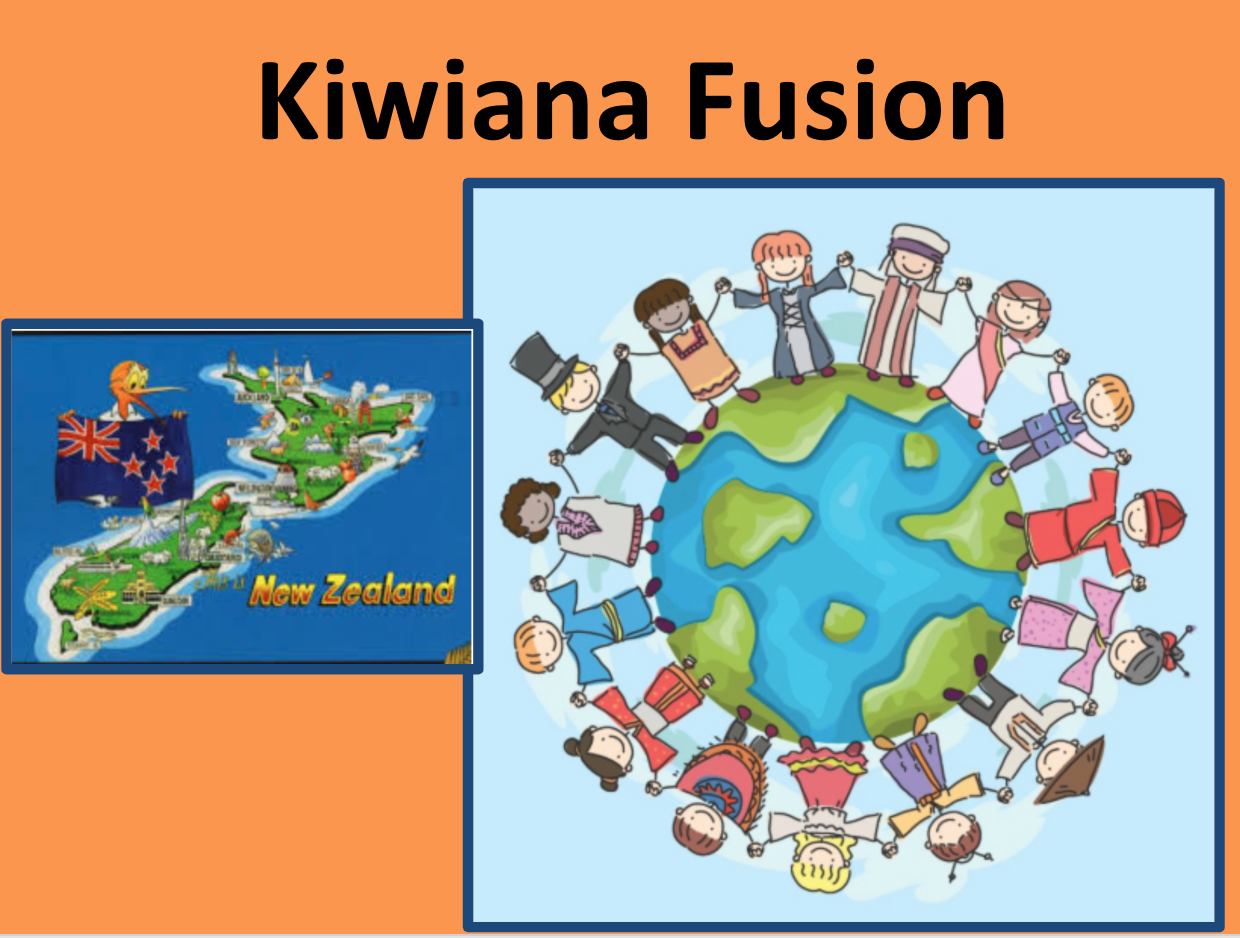
EXPLORE / TŪHURA learning intentions:
- We are EXPLORING the meaning of Kiwiana
- We are EXPLORING how to identify Kiwiana
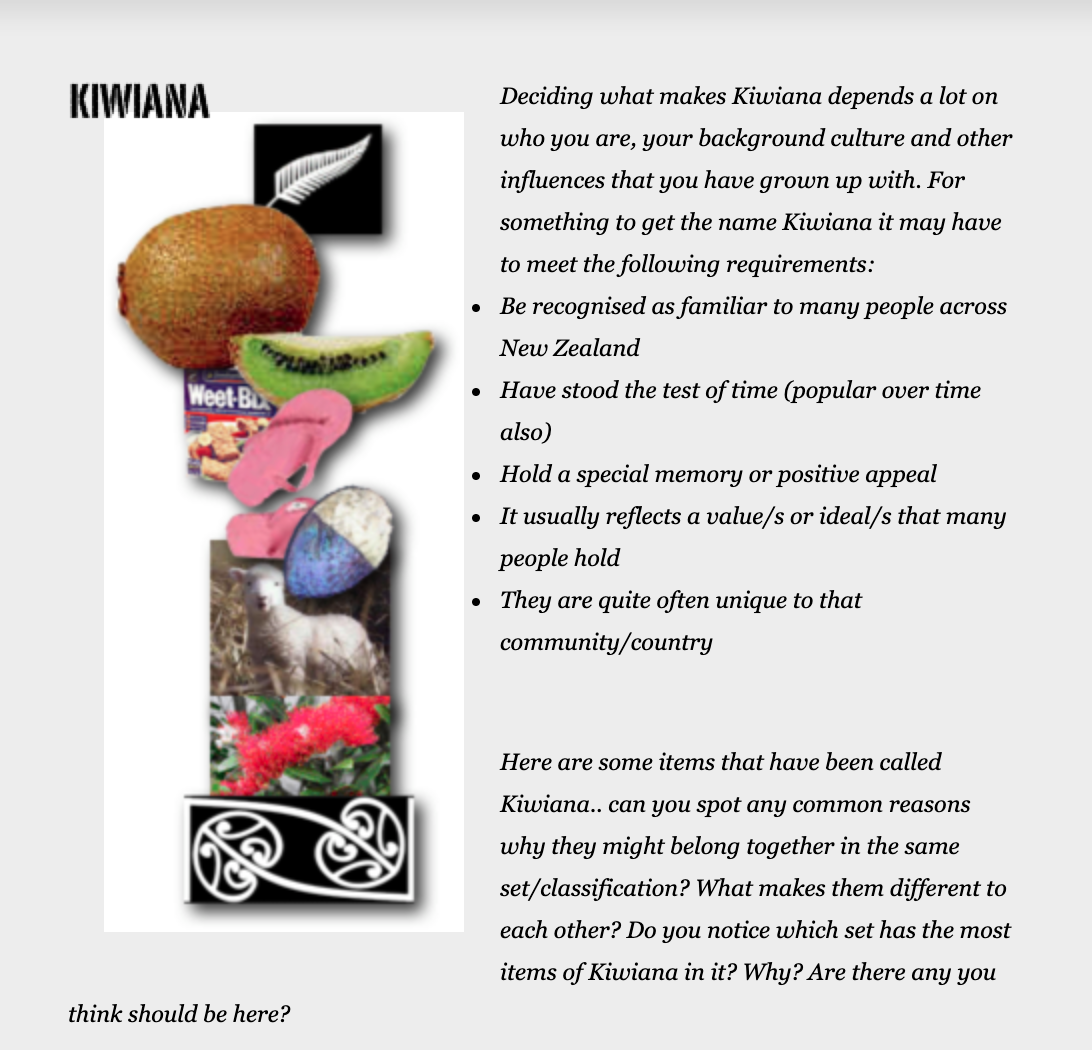
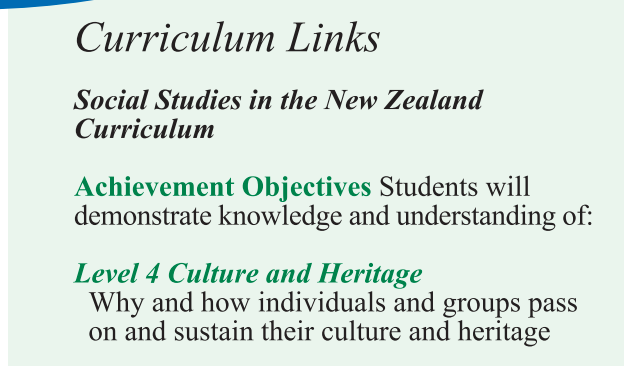

Success Criteria: I can/have...
- Explain what Kiwiana means.
- Identify Kiwiana items.
Activities:
- Refer to Kiwiana Town documents on Google Classroom to become familiar with Kiwiana https://classroom.google.com/u/0/w/MjY3NzI0ODExNTY1/t/all
- Now that you’ve become familiar with each display, use the google doc created for each student on Google Classroom to complete the quiz.
- Answers to be completed and turned in by Friday 22 October at 3pm.
-
Kia ora 7C2,
This week we will be completing our Assessment 2: Mapping skills.
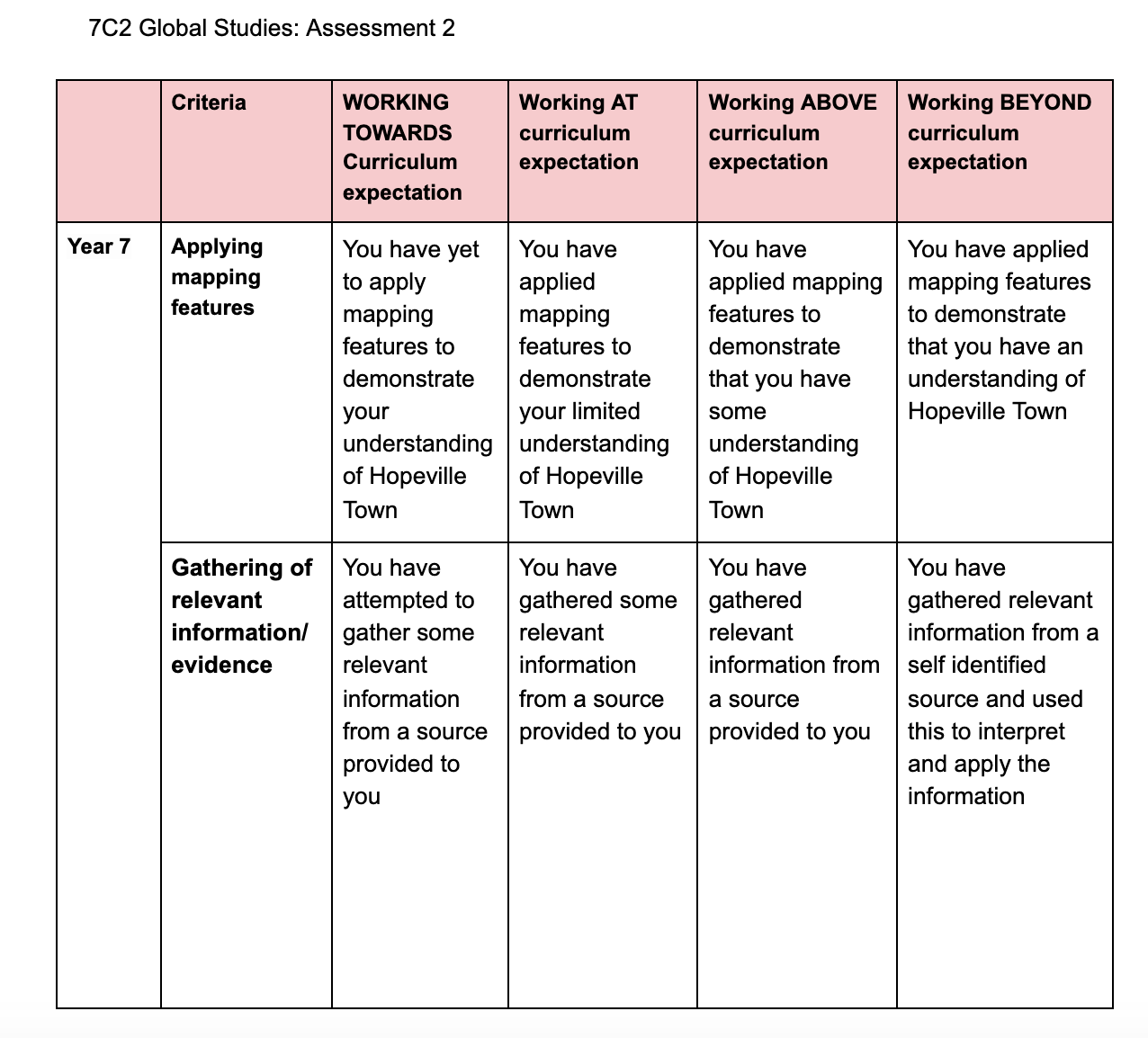
- Please ensure that you join our Google Meet class on Wednesday, 27 October from 12.30pm - 1.30pm.
- We will be completing our Global Studies Assessment 2 during this Google Meet session.
- I will be sharing the assessment doc with you during this session.
- Once you have completed your assessment you will turn it in on Google Classroom. You can then leave the Google Meet.
- A reminder that you must have your cameras on for our session.
- In order to prepare for this assessment, please go over our mapping skills activities that we completed last term on Hopeville Town. These resources were put on MHOL and Google Classroom last term.:)
FOCUS / ARONGA learning intentions:
- We are FOCUSING on applying our mapping skills.
- We are FOCUSING on explaining directions, using a map.
- We are FOCUSING on following directions and answering questions involving map work.
Success Criteria: I can/have...
- Follow directions.
- Apply my mapping skills.
Activities:
- Revise the mapwork activities completed in Term 3 : Hopeville map challenge on Google Classroom.
https://classroom.google.com/u/0/c/MjY3NzI0ODExNTY1/a/Mzg3MzU5MzQ0NTM2/details

Refer to challenge cards and Map on our 7C2 Google classroom.
-

Kia ora 7C2,
EXPLORE / TŪHURA learning intentions:
- We are EXPLORING the meaning of Kiwiana
- We are EXPLORING how to identify Kiwiana

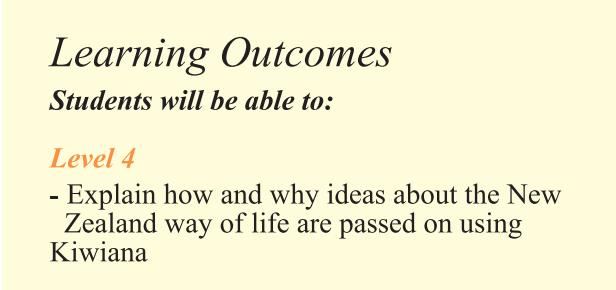
Success Criteria: I can/have...
- Identify Kiwiana items.
Activities:
- Refer to Kiwiana Town documents on Google Classroom to become familiar with Kiwiana https://classroom.google.com/u/0/w/MjY3NzI0ODExNTY1/t/all
- Now that you’ve become familiar with each display, create your own doc on Google Classroom, complete the quiz and turn in your answers.
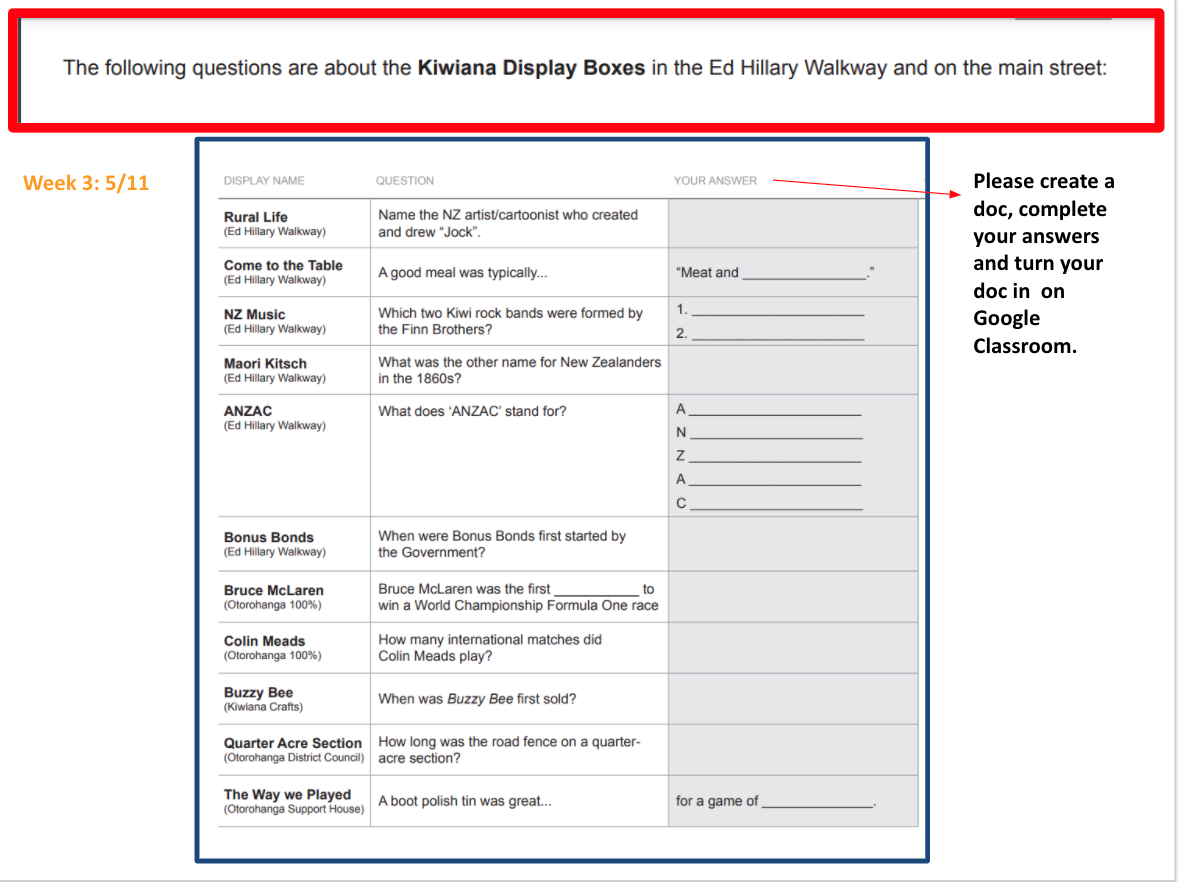 Answers to be completed and turned in by Thursday 4 November at 3pm.
Answers to be completed and turned in by Thursday 4 November at 3pm. -

Kia ora 7C2,
EXPLORE / TŪHURA learning intentions:
- We are EXPLORING the meaning of Kiwiana
- We are EXPLORING how to identify Kiwiana


Success Criteria: I can/have...
- Identify Kiwiana items.
Activities:
- Refer to Kiwiana Town documents on Google Classroom to become familiar with Kiwiana https://classroom.google.com/u/0/w/MjY3NzI0ODExNTY1/tc/Mjc4NzM3NTI0OTI5
- Now that you’ve become familiar with each display, create your own doc on Google Classroom, complete the quiz and turn in your answers.
Answers to be completed and turned in by Thursday 11 November at 3pm.
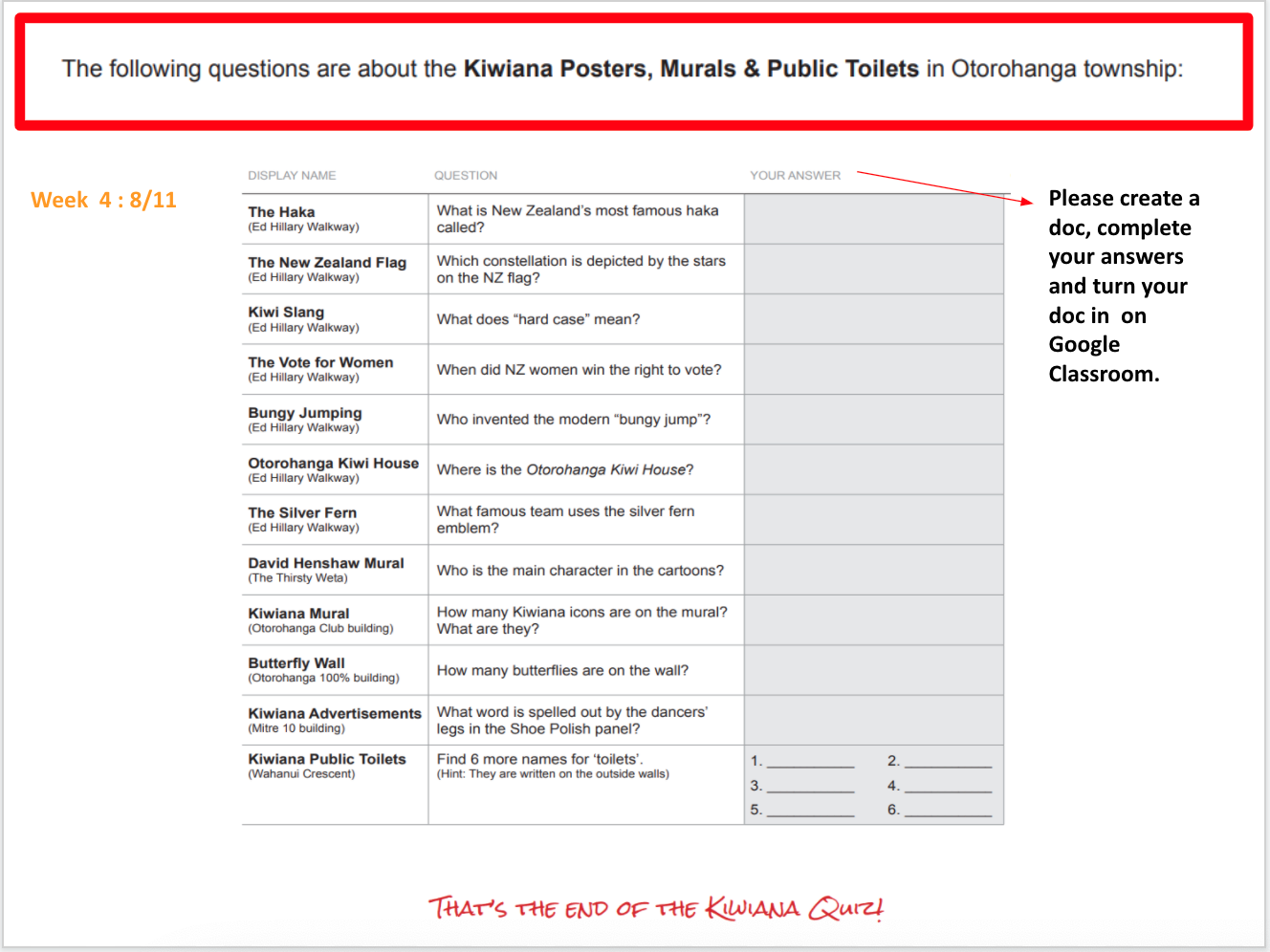
-
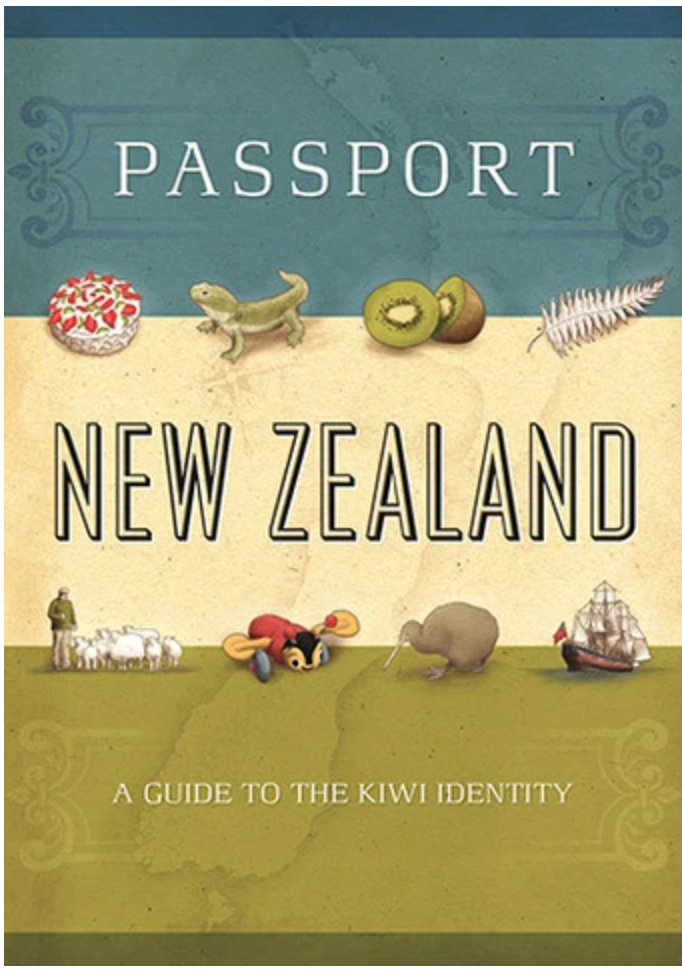
Kia ora 7C2,
EXPLORE / TŪHURA learning intentions:
- We are EXPLORING our kiwi identity
- We are EXPLORING how to identify a kiwi


Success Criteria: I can/have...
- Explain the kiwi identity.
- Share my ideas about what makes ME a kiwi
Activities:
Remember to refer to our Google Classroom for further instructions, before starting your work.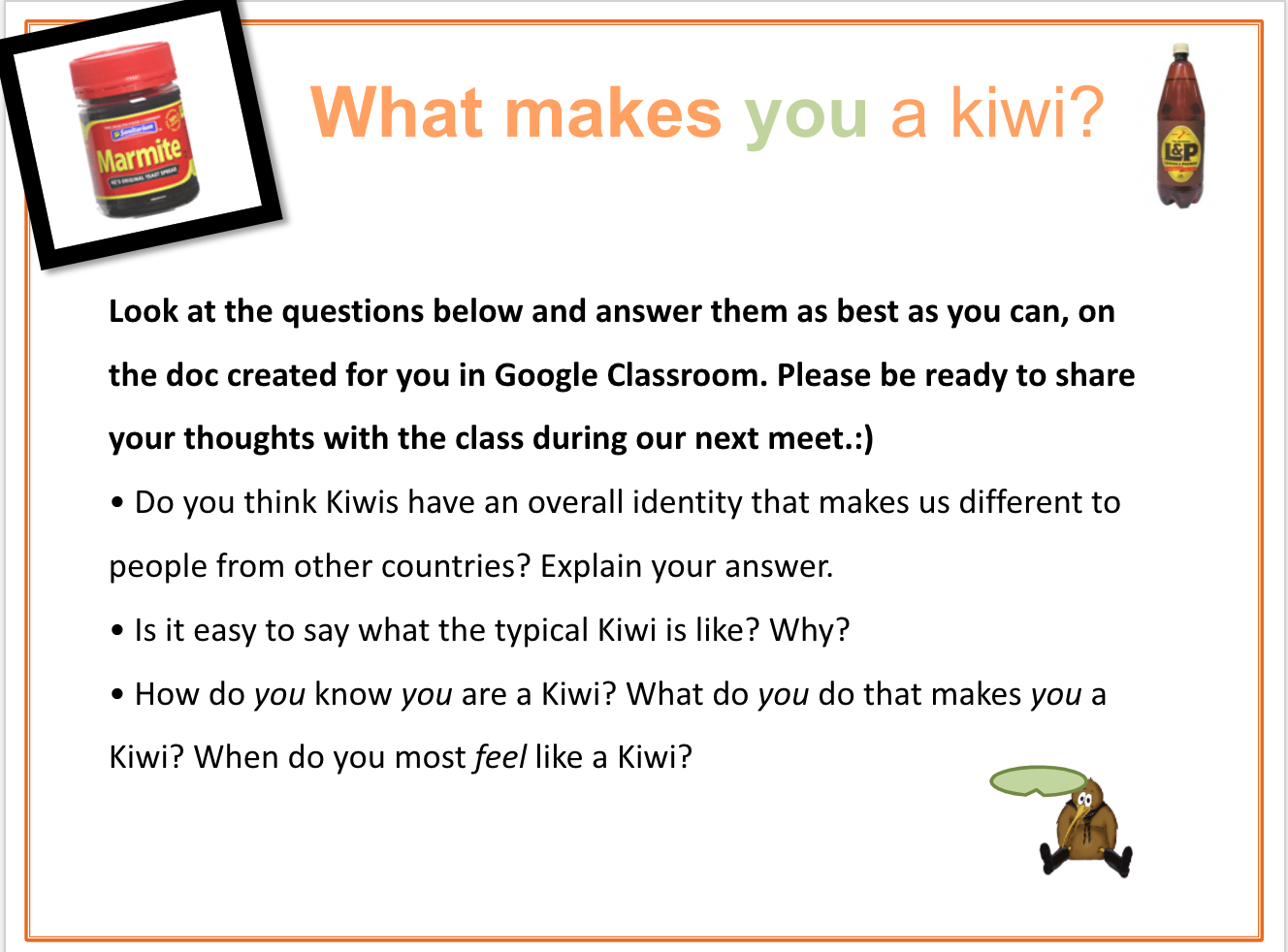
-
Kia ora 7C2,
What’s so awesome about New Zealand?
Learning Outcome/ hua akoranga:
I have identified a variety of aspects of New Zealand (people, country and cultures)
I have identified how tourism can help to sustain and pass on culture and heritage
Imagine that you are writing to a student from New York, USA. They have never visited New Zealand. They want to know what New Zealand is like.
Write a letter to this student, including the following:
what YOU think is awesome about New Zealand
what makes New Zealand special?
where might the student want to visit, should they travel to New Zealand on holiday in the future? You could include your own experiences of visiting places around NZ. You should aim to write about a variety of experiences:
cultural events
significant places (historical, cultural, sporting…etc)
activities
Note: remember that your audience is a 12 year old student
what should they know about New Zealand before they visit?
Notes:
You can include maps and pictures with your letter.
You do not need to discuss COVID: the student will not be visiting until borders are open and it is safe to travel.
Write the letter on this document below these instructions
Use the following NZ tourism sites to help you:
https://www.newzealand.com/nz/
https://www.aa.co.nz/travel/
on-the-road/get-outside-10-of- our-favourite-road-trips/ -
Kia ora 7C2,
What’s so awesome about your culture?
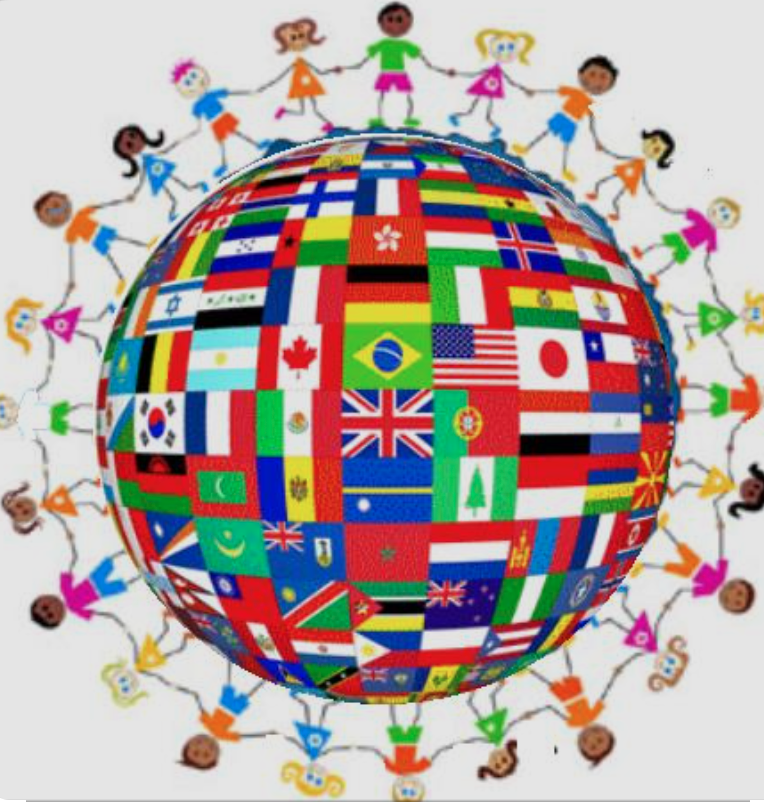
Learning Outcome/ hua akoranga:
I have identified a variety of aspects of New Zealand (people, country and cultures)
I have identified how tourism can help to sustain and pass on culture and heritage
Imagine that you are writing to a student from New York, USA. They are visiting New Zeland and would like to know more about you, your culture and the similarities and differences of your culture to the New Zealand Culture.
Write a letter to this student, including the following:
What YOU think is awesome about your culture.
What makes your culture special?
Where might the student want to visit, should they travel around the world on holiday in the future - so that they can gain a better understanding of your culture? You could include your own experiences of visiting places around NZ or in a different country. You should aim to write about a variety of experiences:
cultural events
significant places (historical, cultural, sporting…etc)
activities
Note: remember that your audience is a 12 year old student
what should they know about New Zealand before they visit?
Notes:
You can include maps and pictures with your letter.
You do not need to discuss COVID: the student will not be visiting until borders are open and it is safe to travel.
Write the letter on this document below these instructions
Use tourism sites from your country to help you:
-
Kia ora 7C2,
Imagine that the New Zealand Tourist board has asked you to create a design on either a billboard , a T-shirt or a flag that will welcome all visitors to New Zealand.
Ensure that your design includes images, symbols and icons that reflect a combination of your culture and our New Zealand identity.
You can design this on paper, or on any app of your choice.
Please upload your completed work on Google Classroom. Hand drawn designs can either be scanned or you can upload a photo of your work.
Some ideas to help you get started:
Cultural events/ celebrations
Places (historical, cultural, sporting…etc)
Activities
What should they know about New Zealand before they visit?
Labour Day
Diwali
waitangi day
Matariki
Anzac day
Eid
Empire Day
Christmas
New year
L&P bottle
queenstown
Mt cook
Rugby
Tram park christchurch
Giant carrot statue
Hobbiton
Mt ruapehu
Ice hockey
Cricket
Anzac cookies
Huka falls
Gumboot day
Sheep
The haka
Sky tower
Visiting Rotorua and going to the lakes
Taking the Cable Car to Botanical Gardens in Wellington
Shopping at Sylvia Park
Museums ( Te Papa, Auckland, etc )
Climbing mountains
Rugby ( All blacks )
Ice hockey
Gumboot throwing/ gumboot day
wildlife
it’s welcoming!
typical foods e.g. fish and chips
te reo Māori - common phrases e.g. hello!

